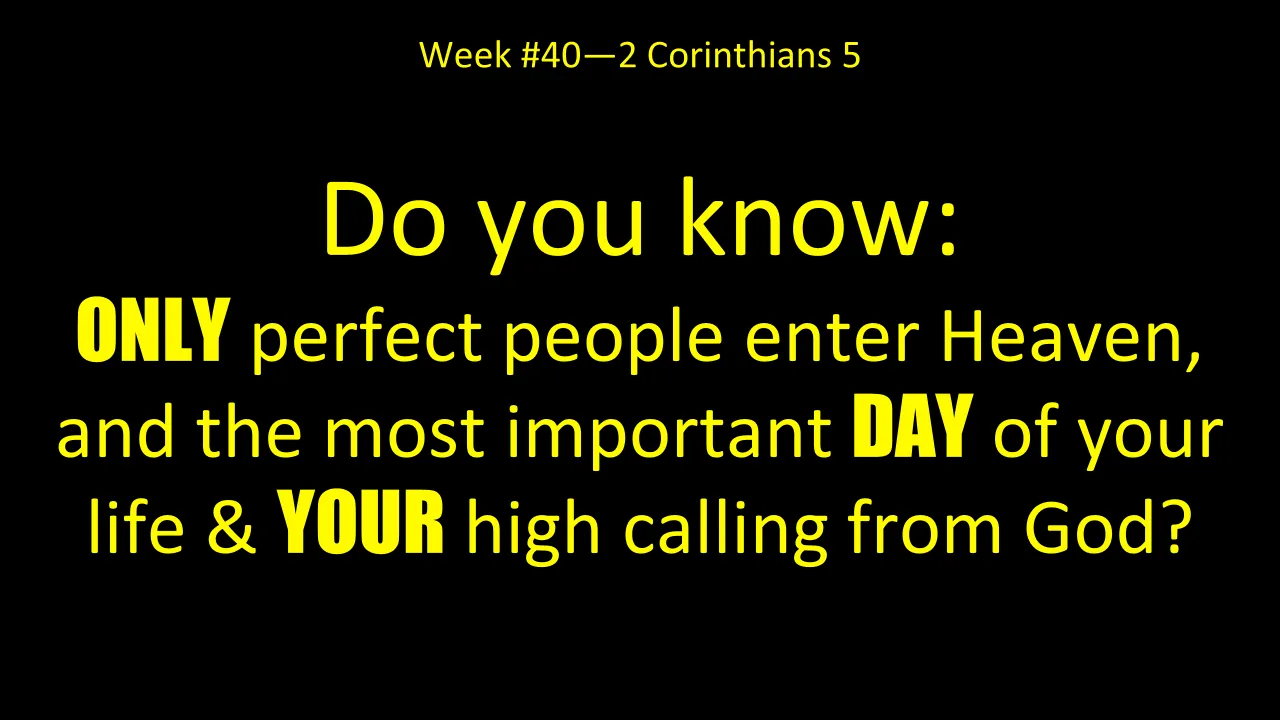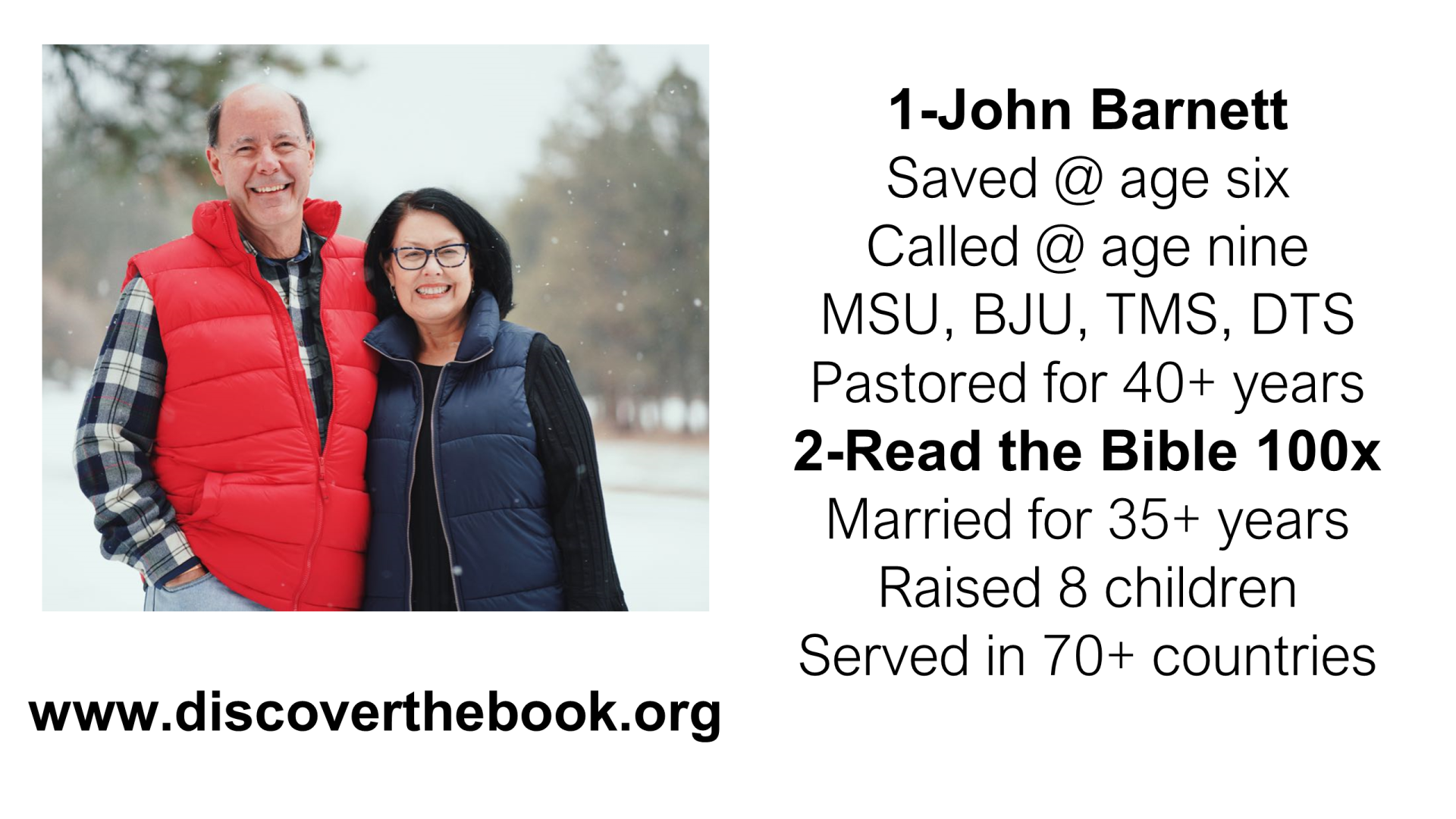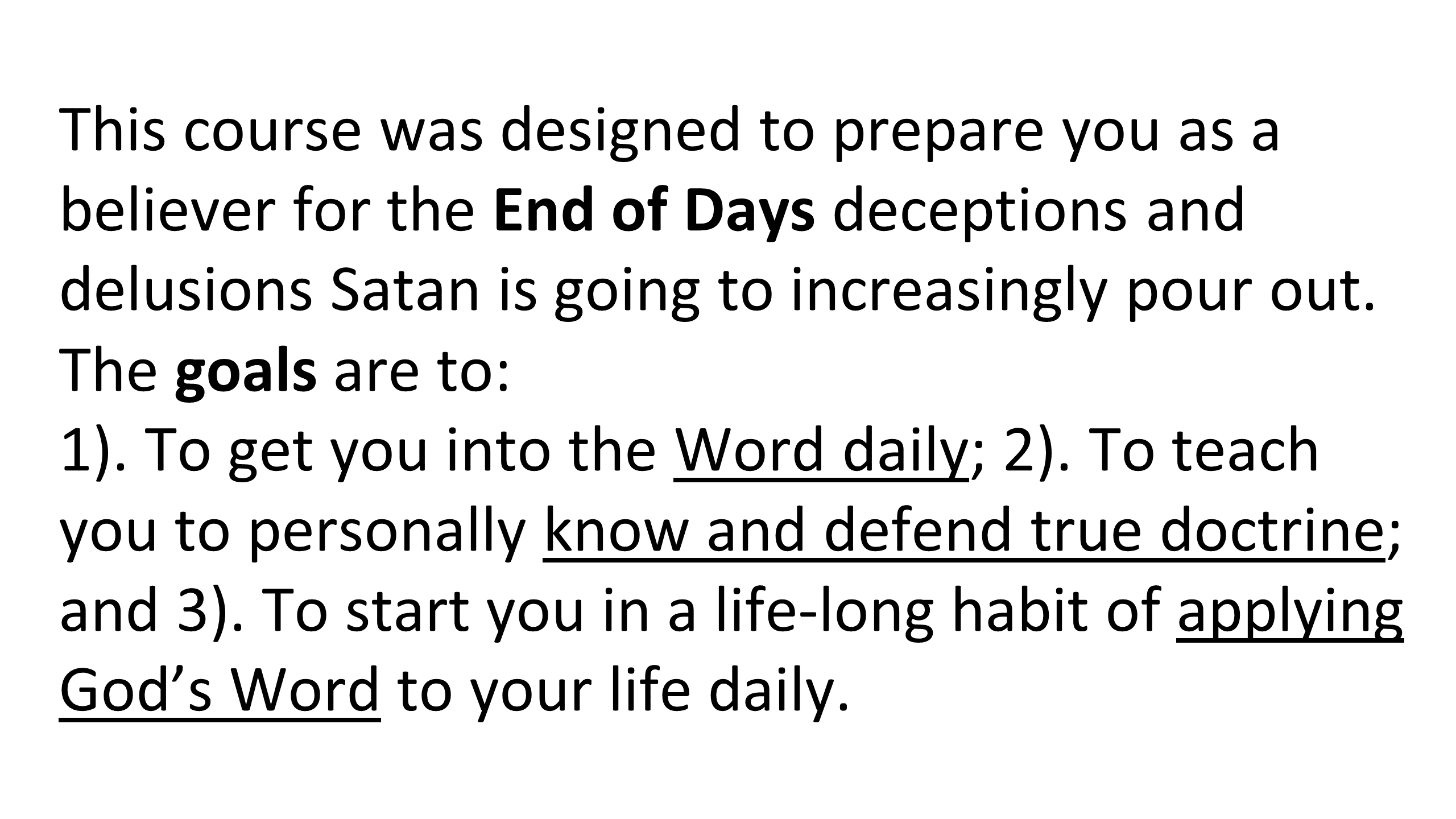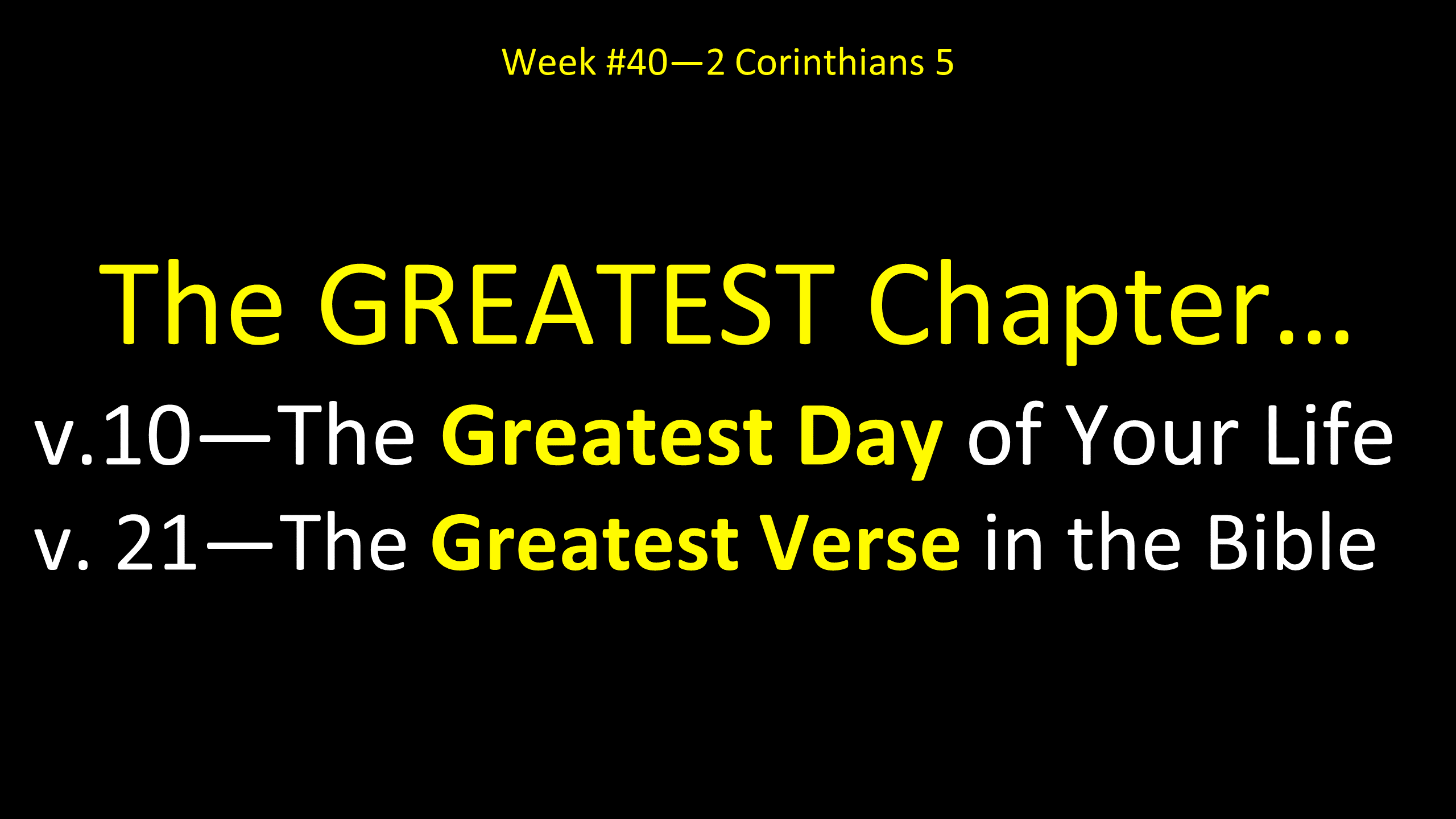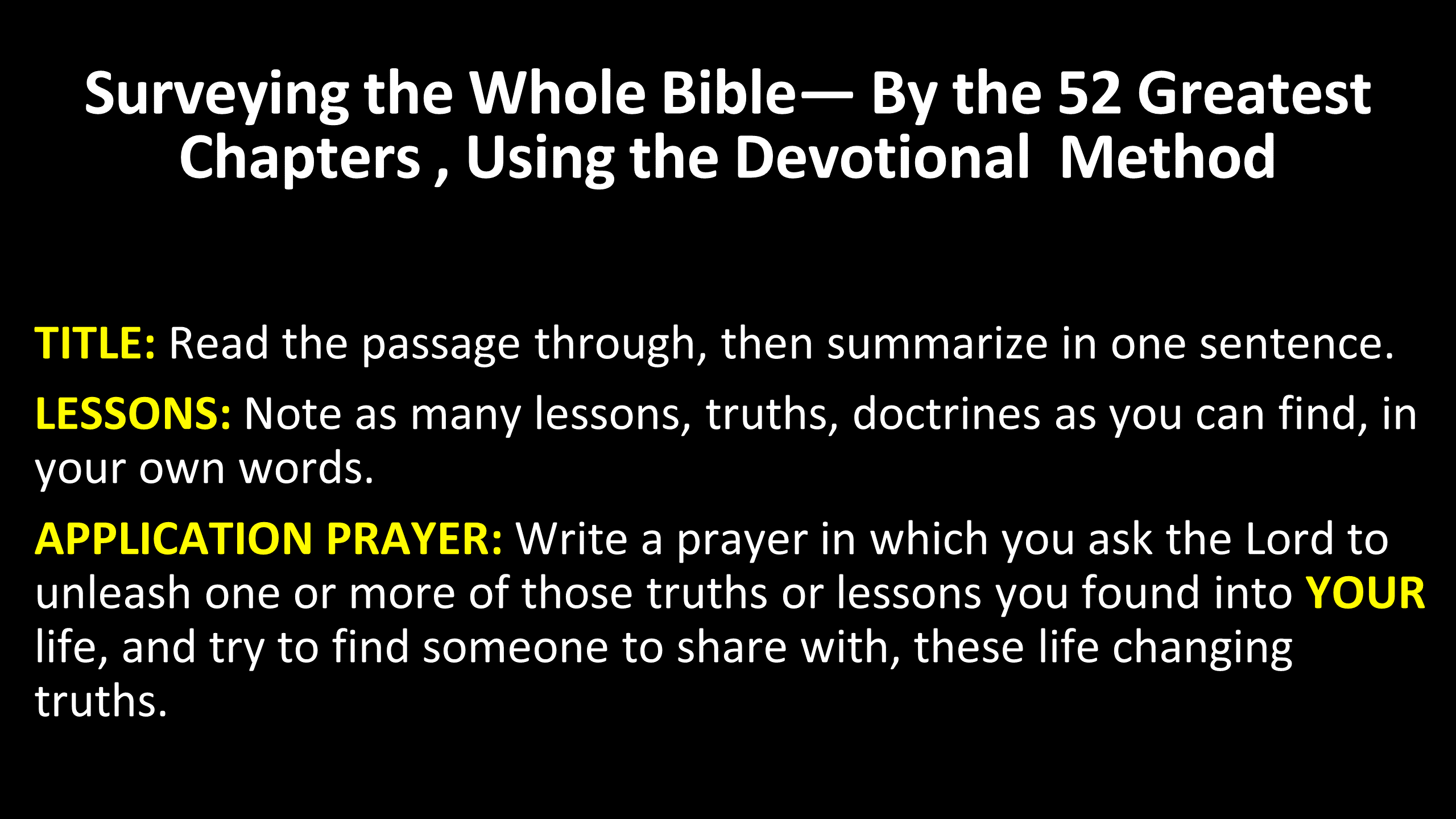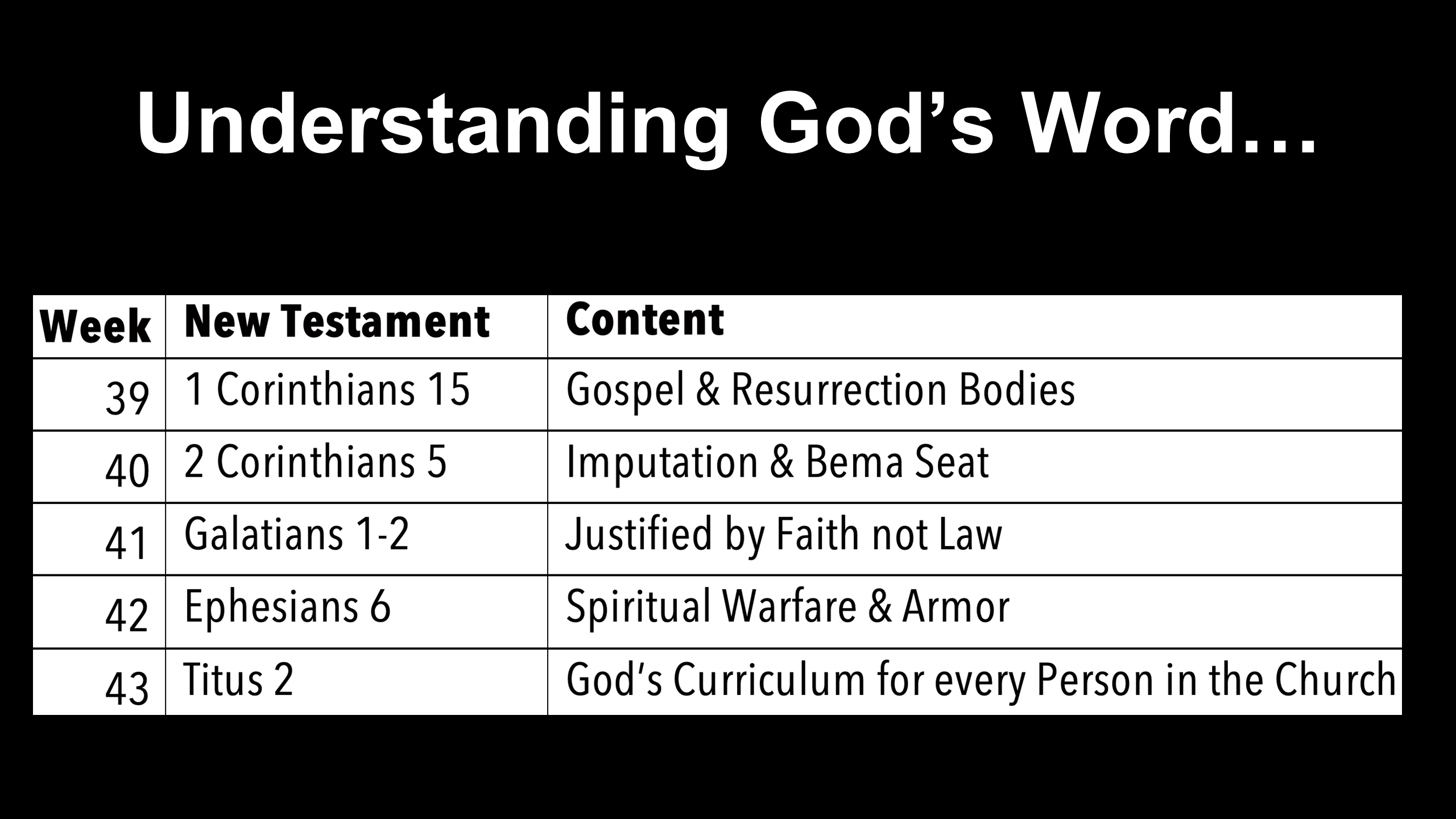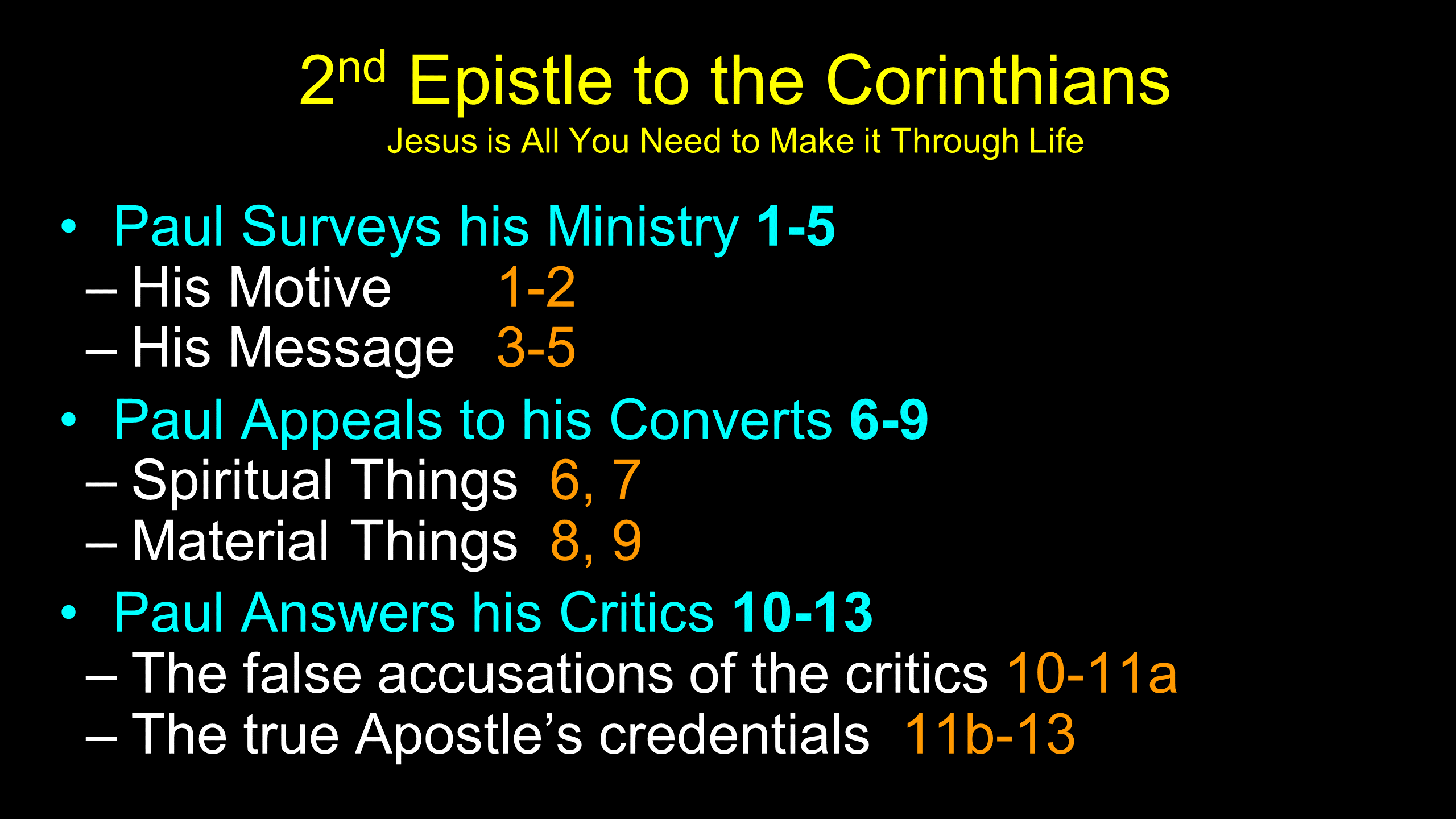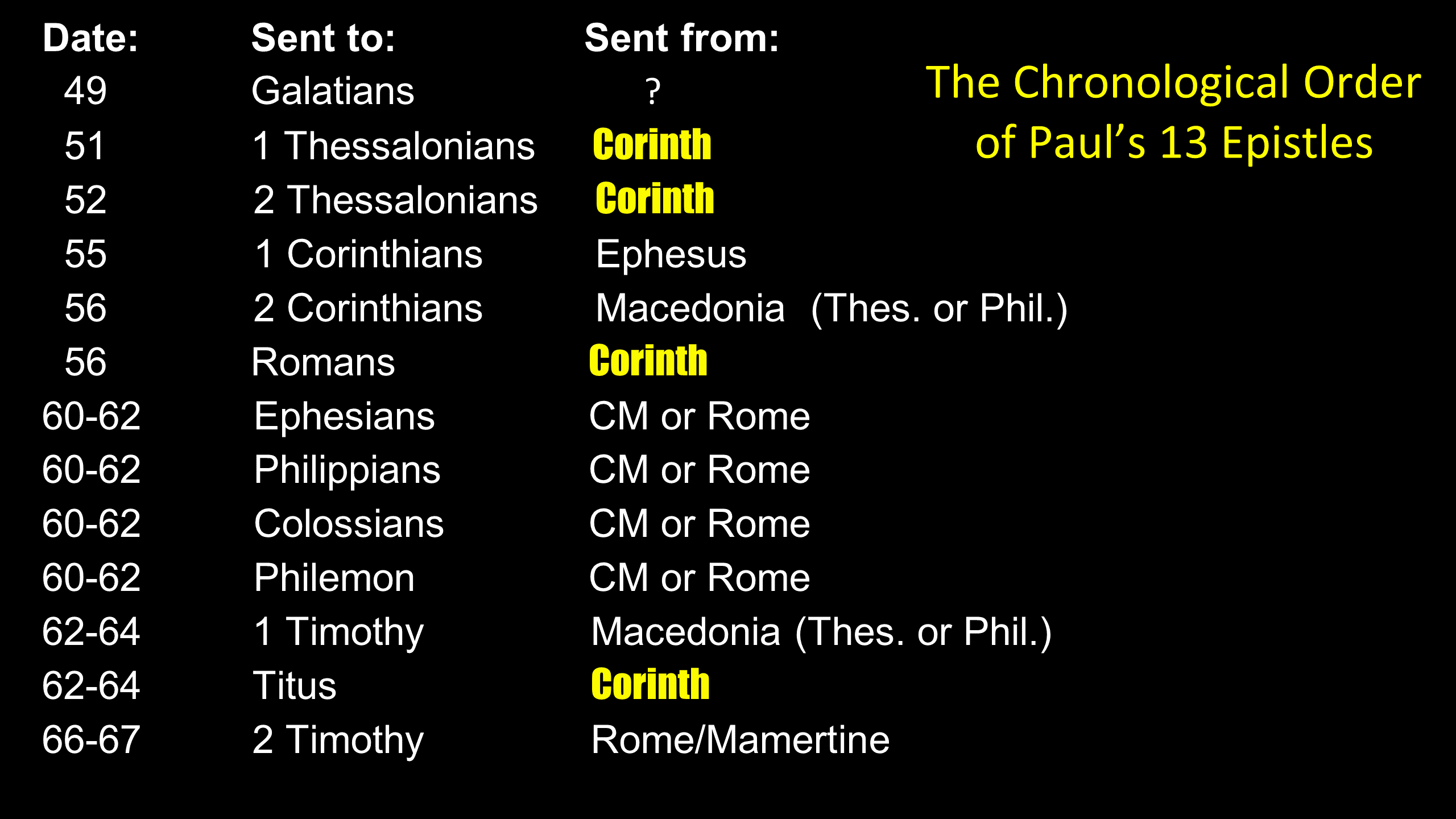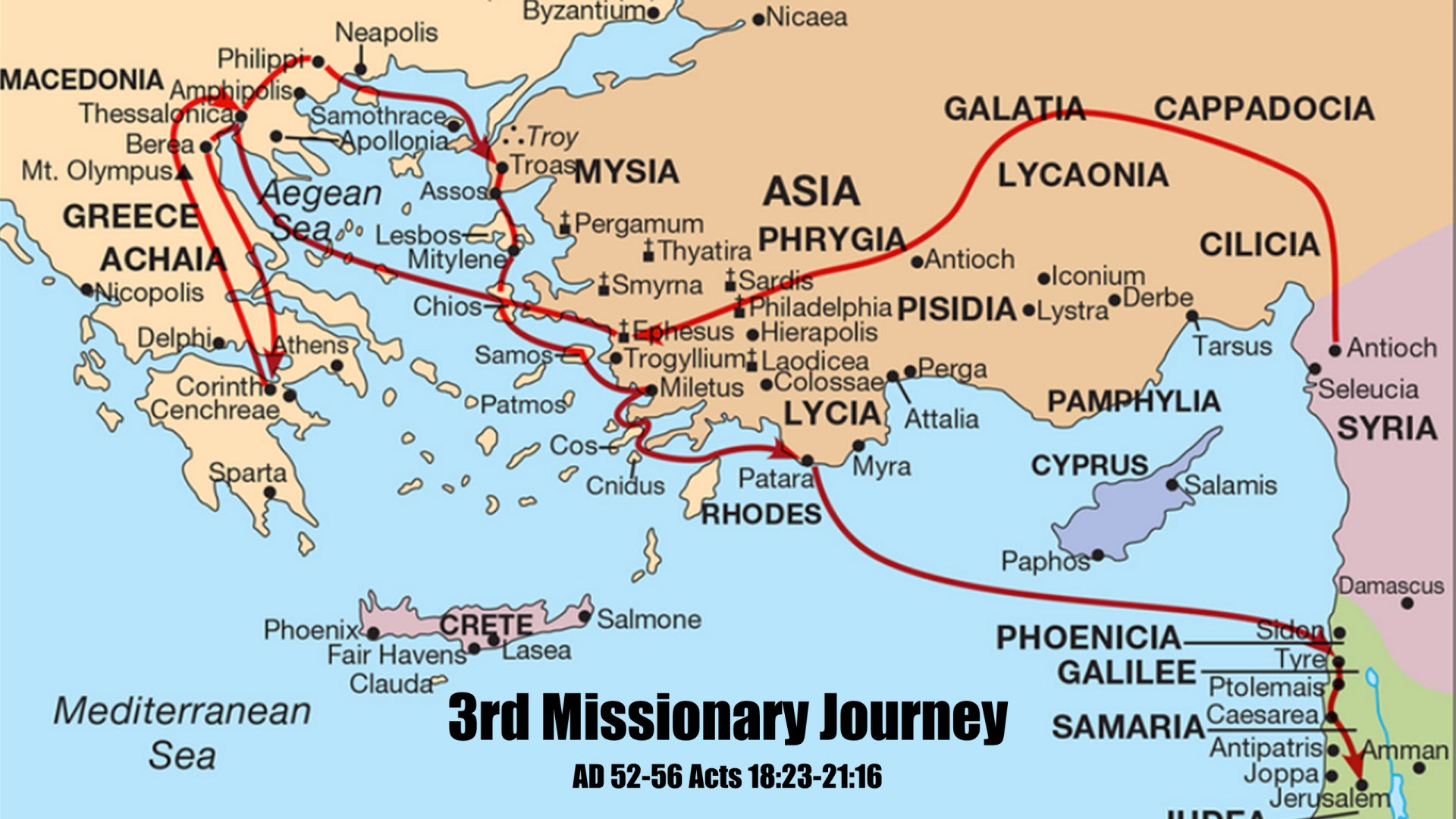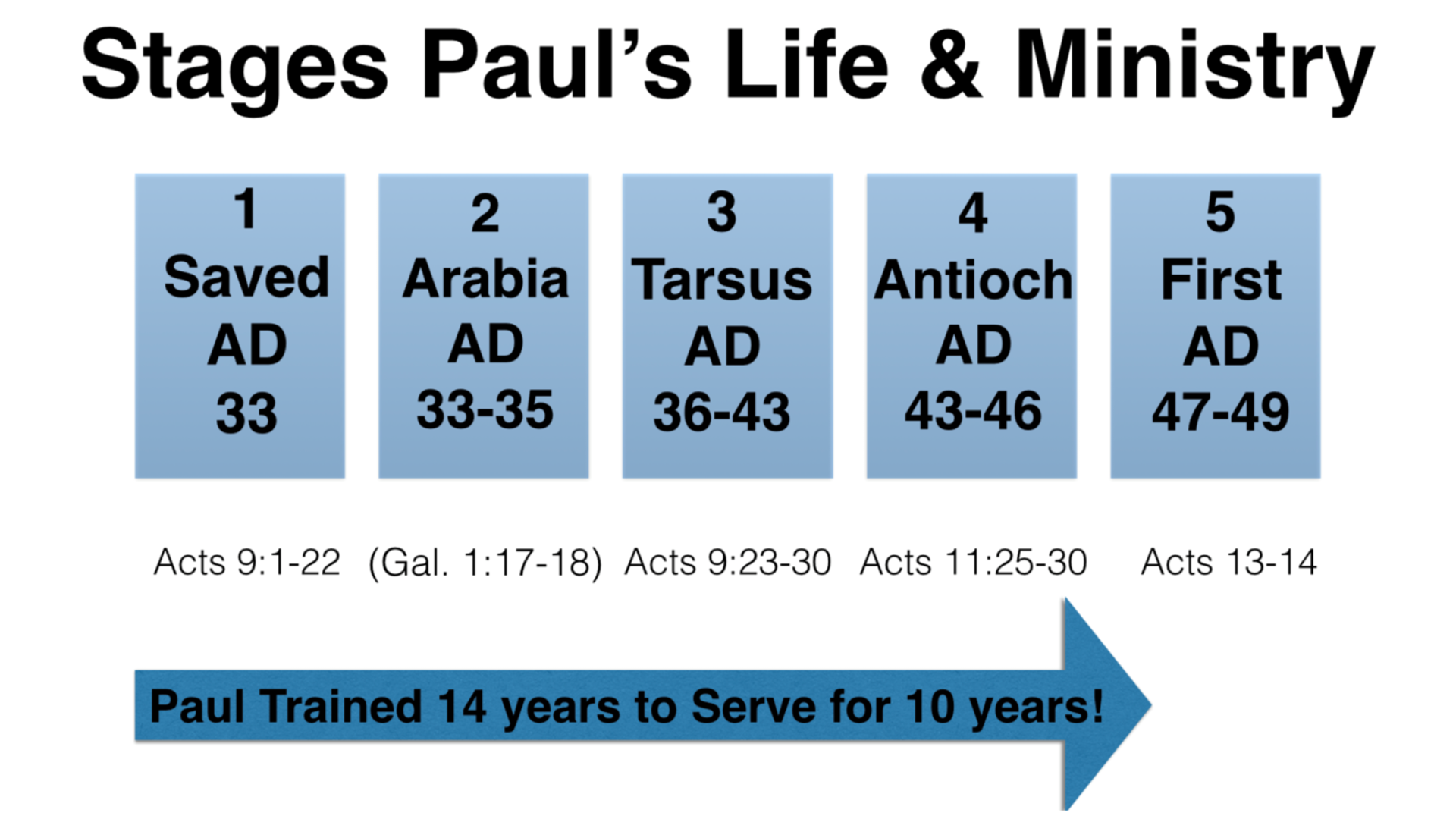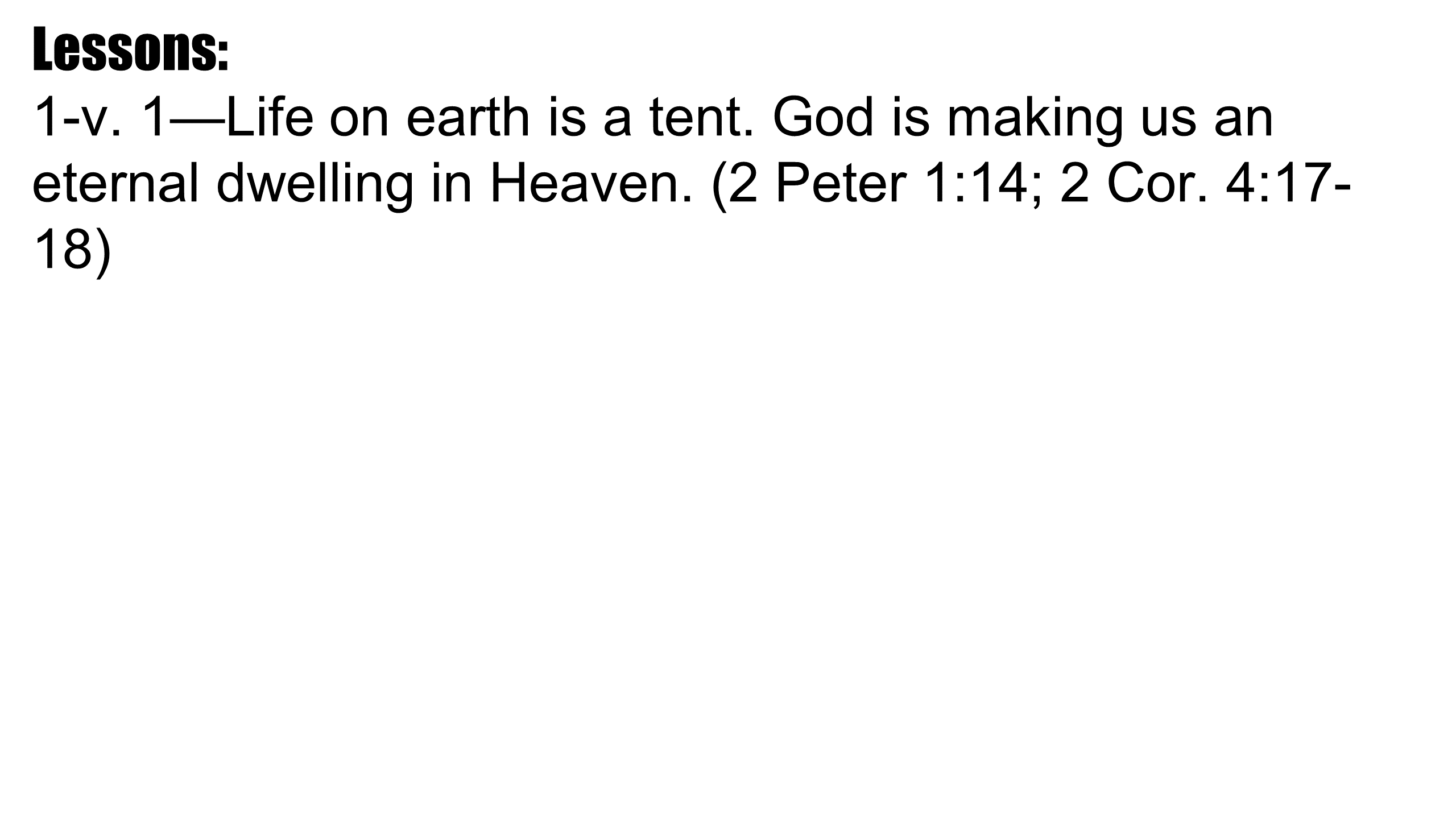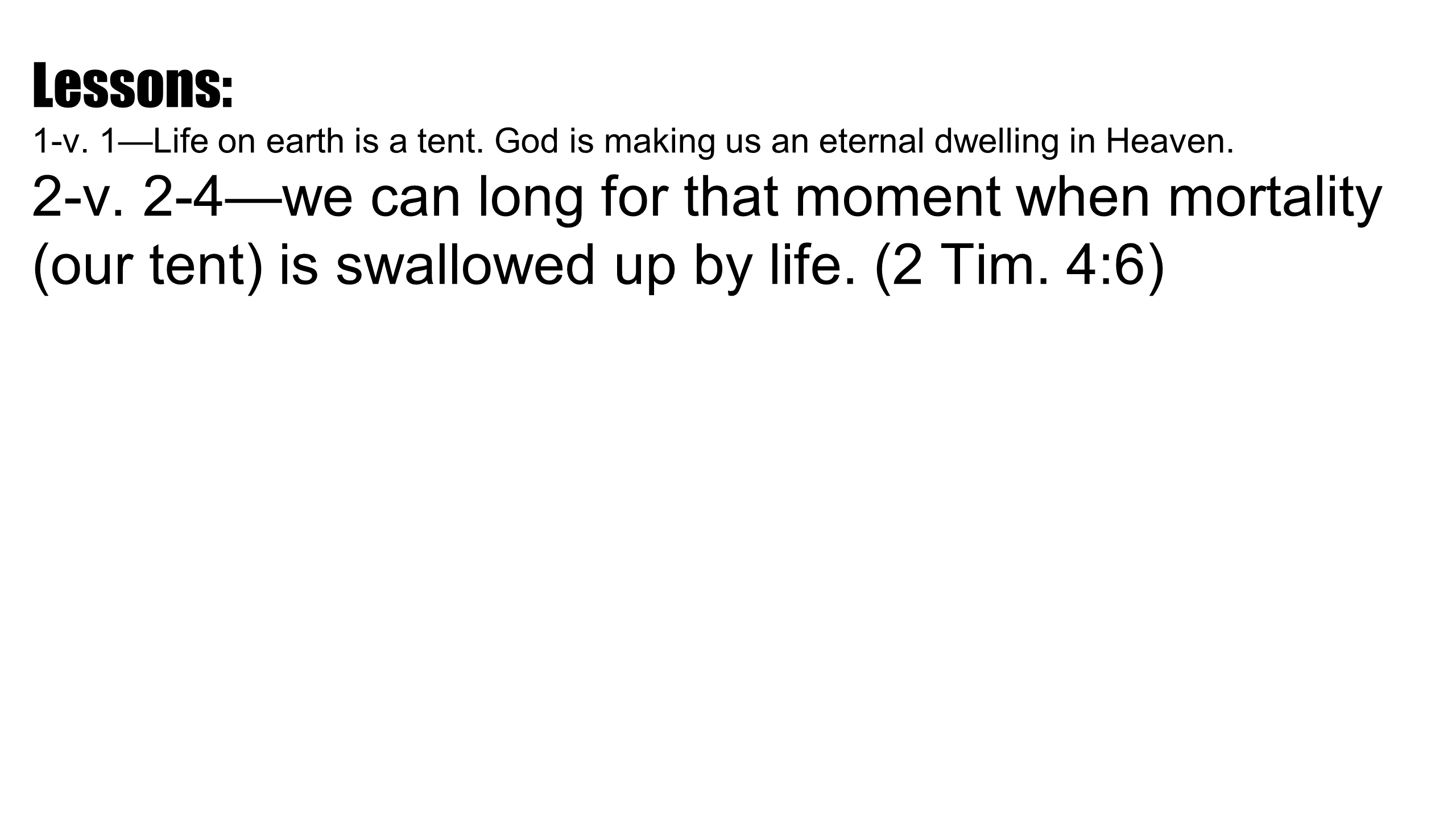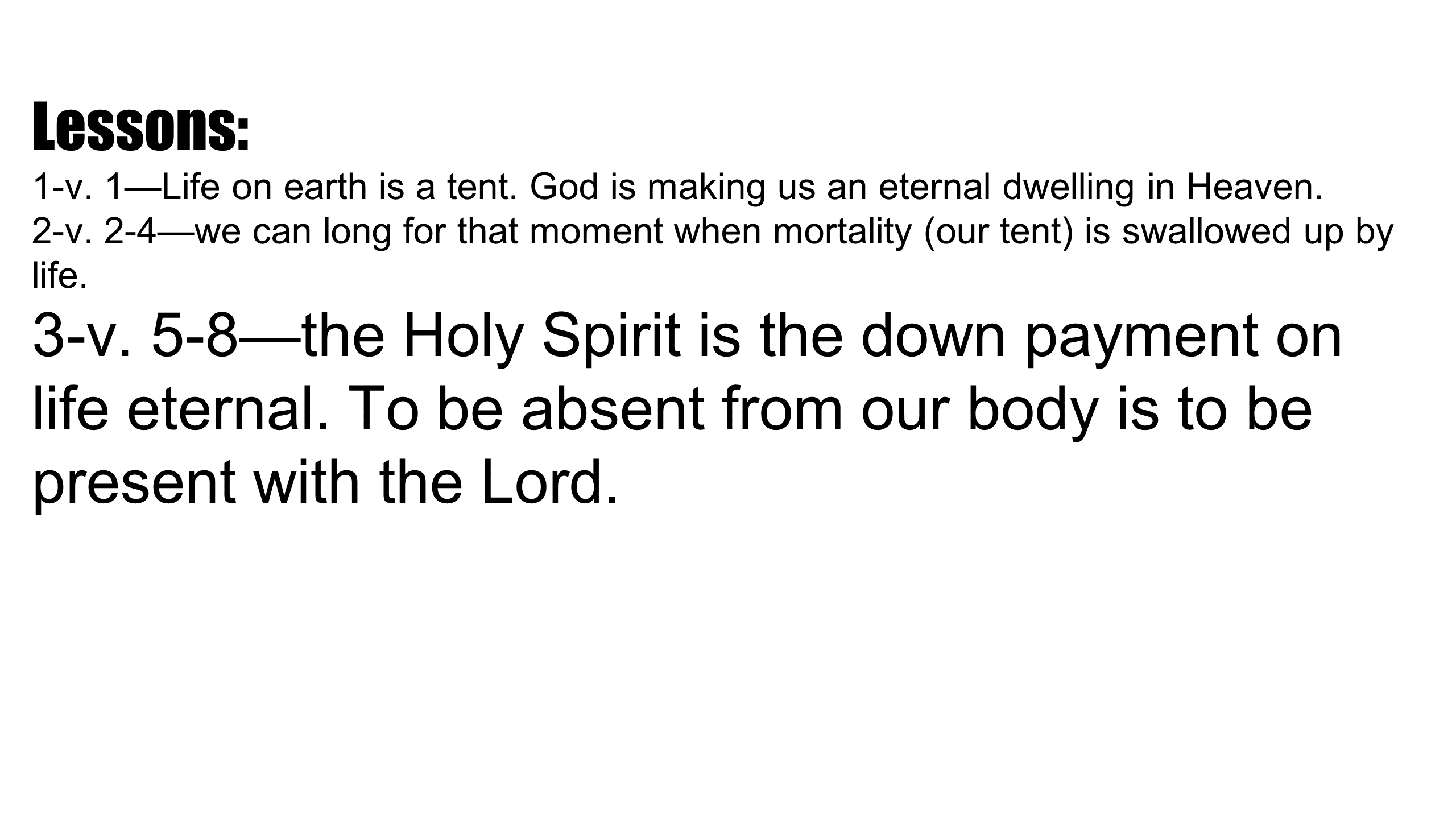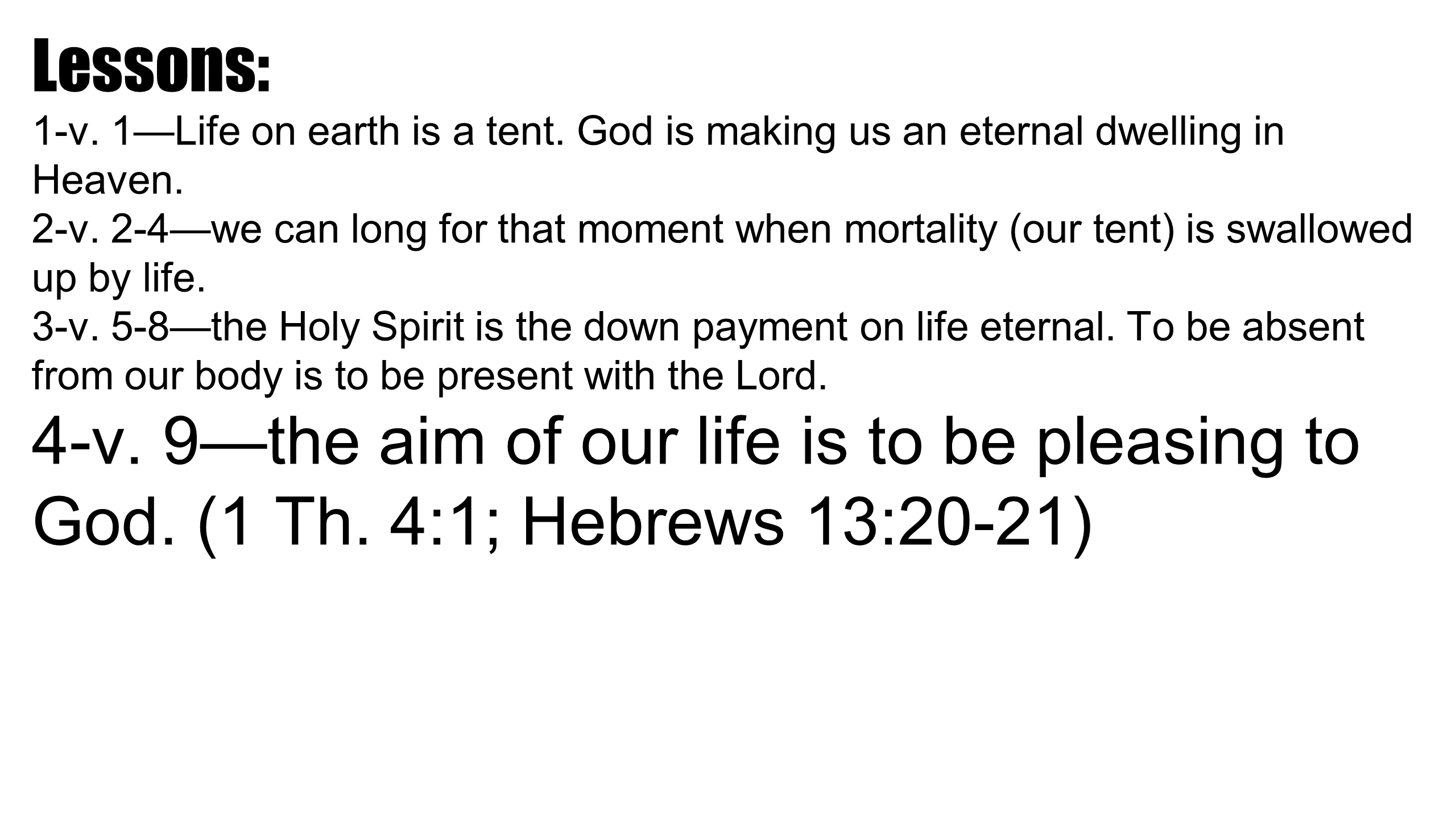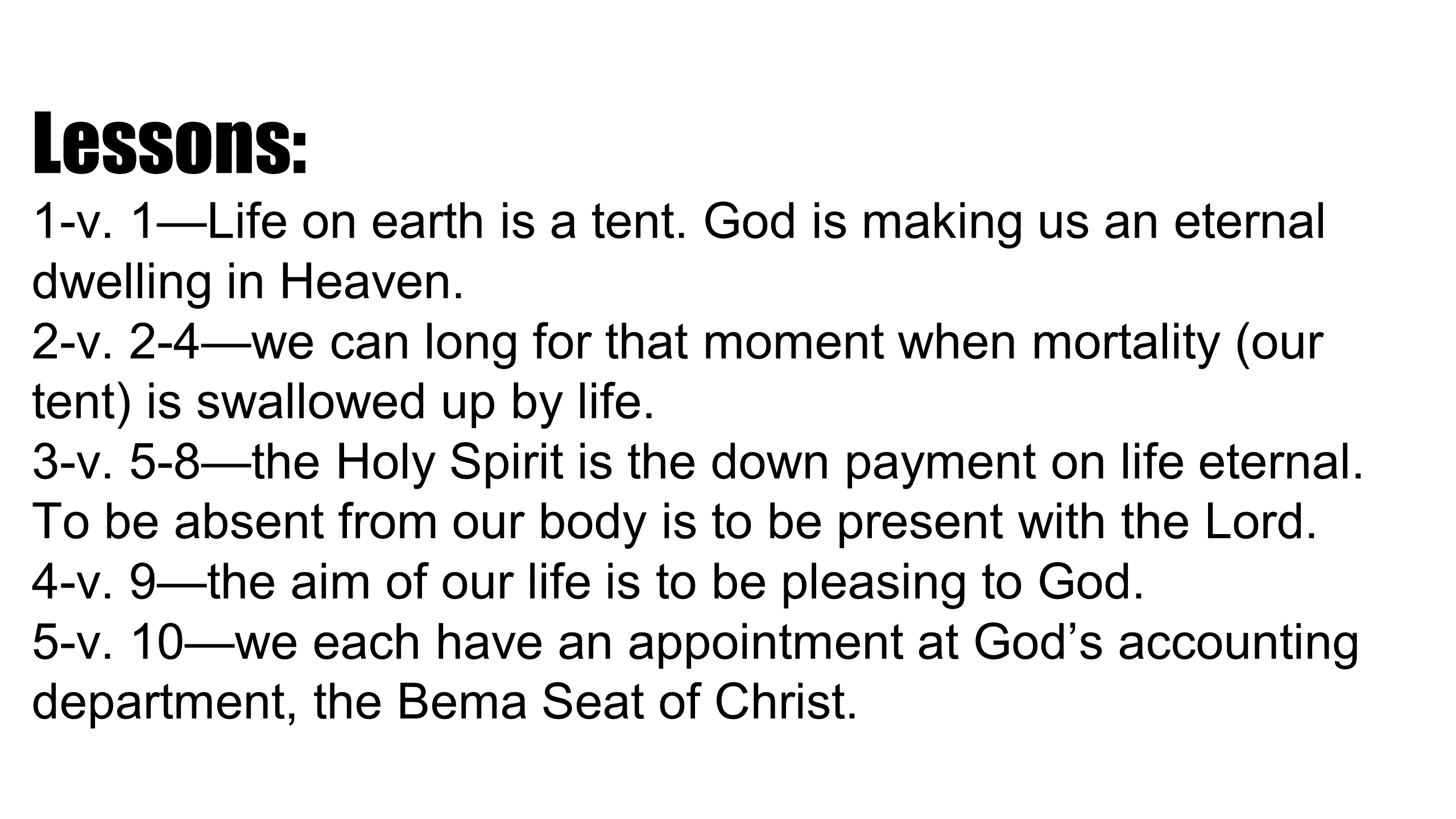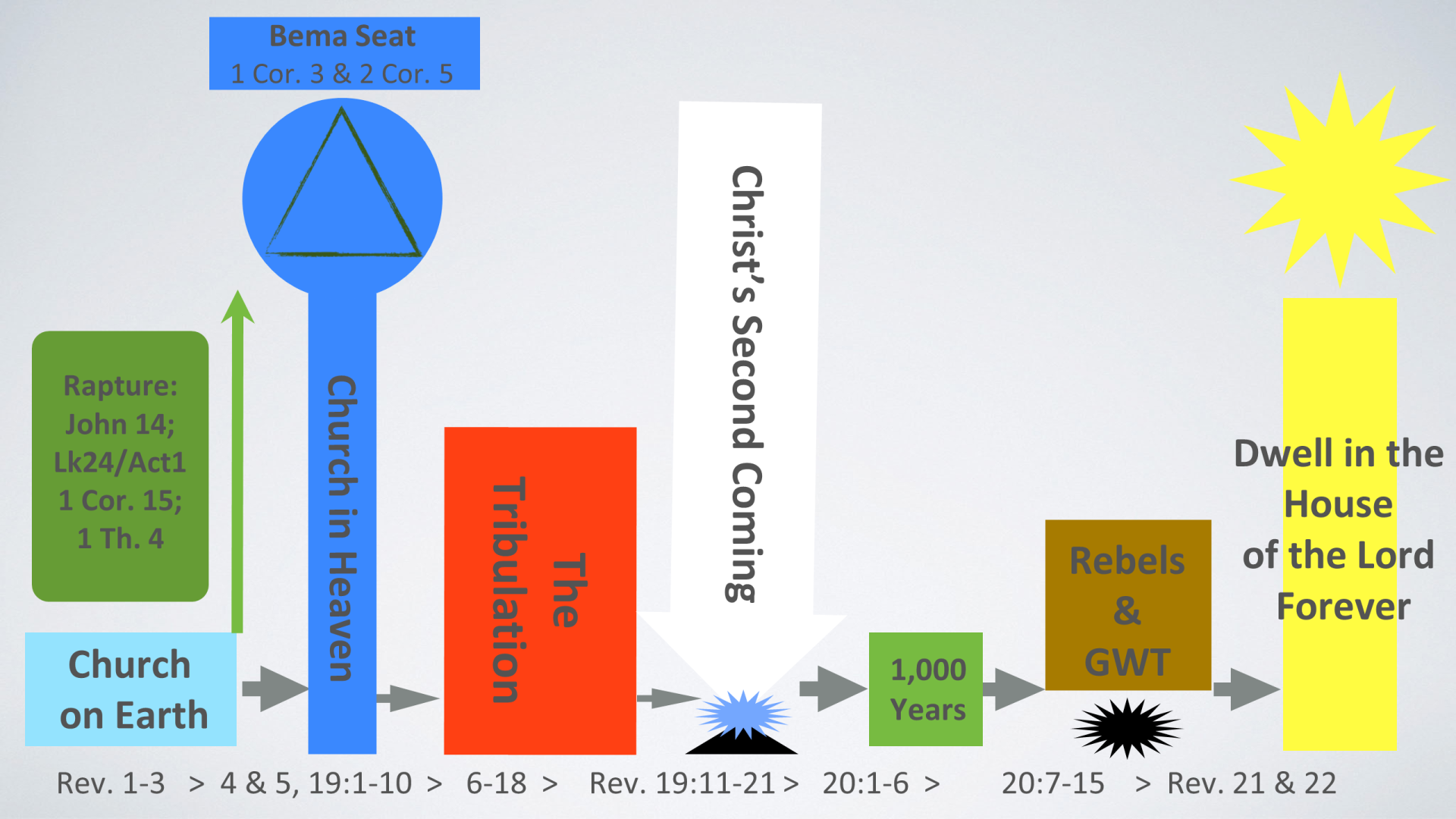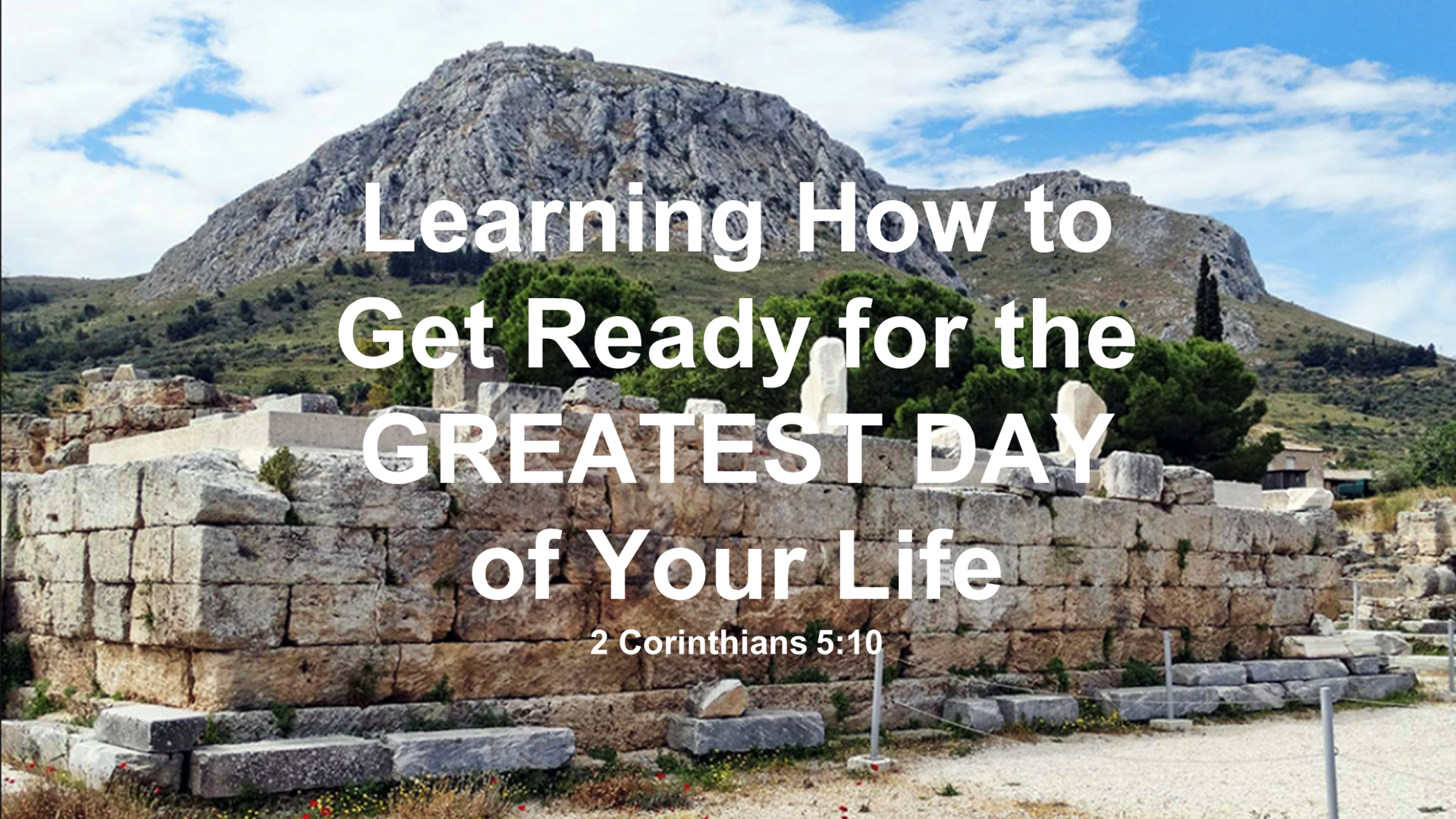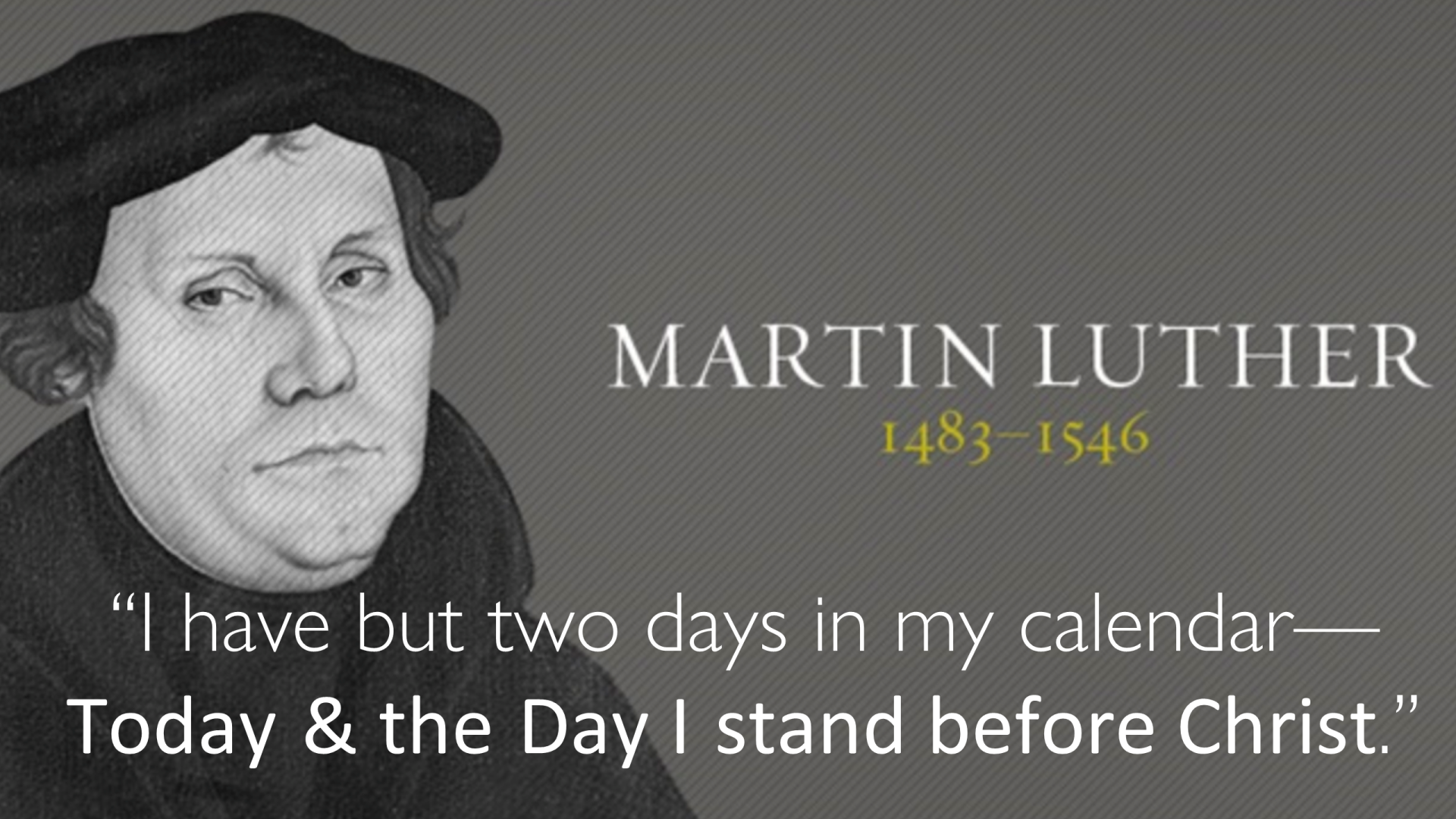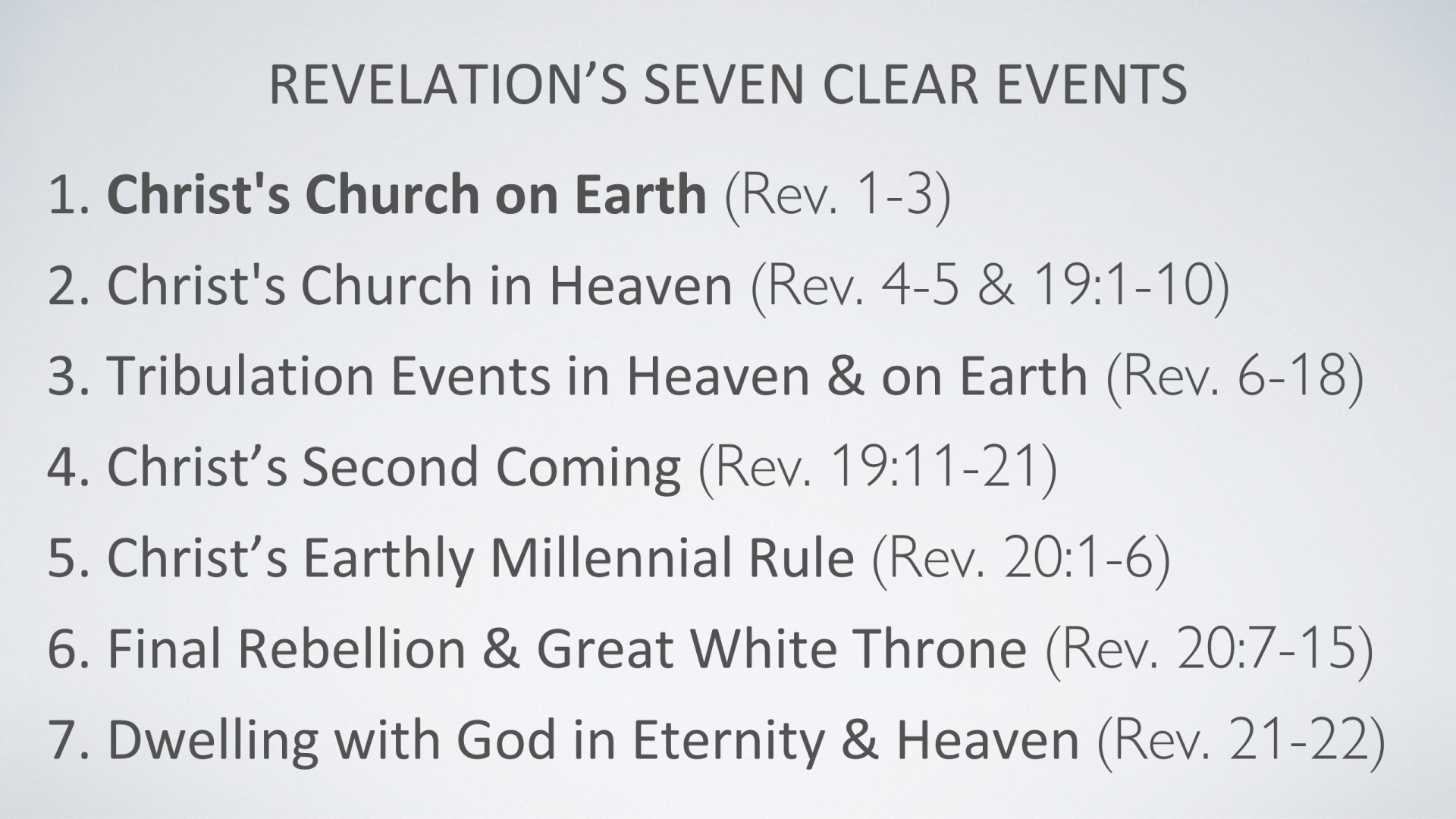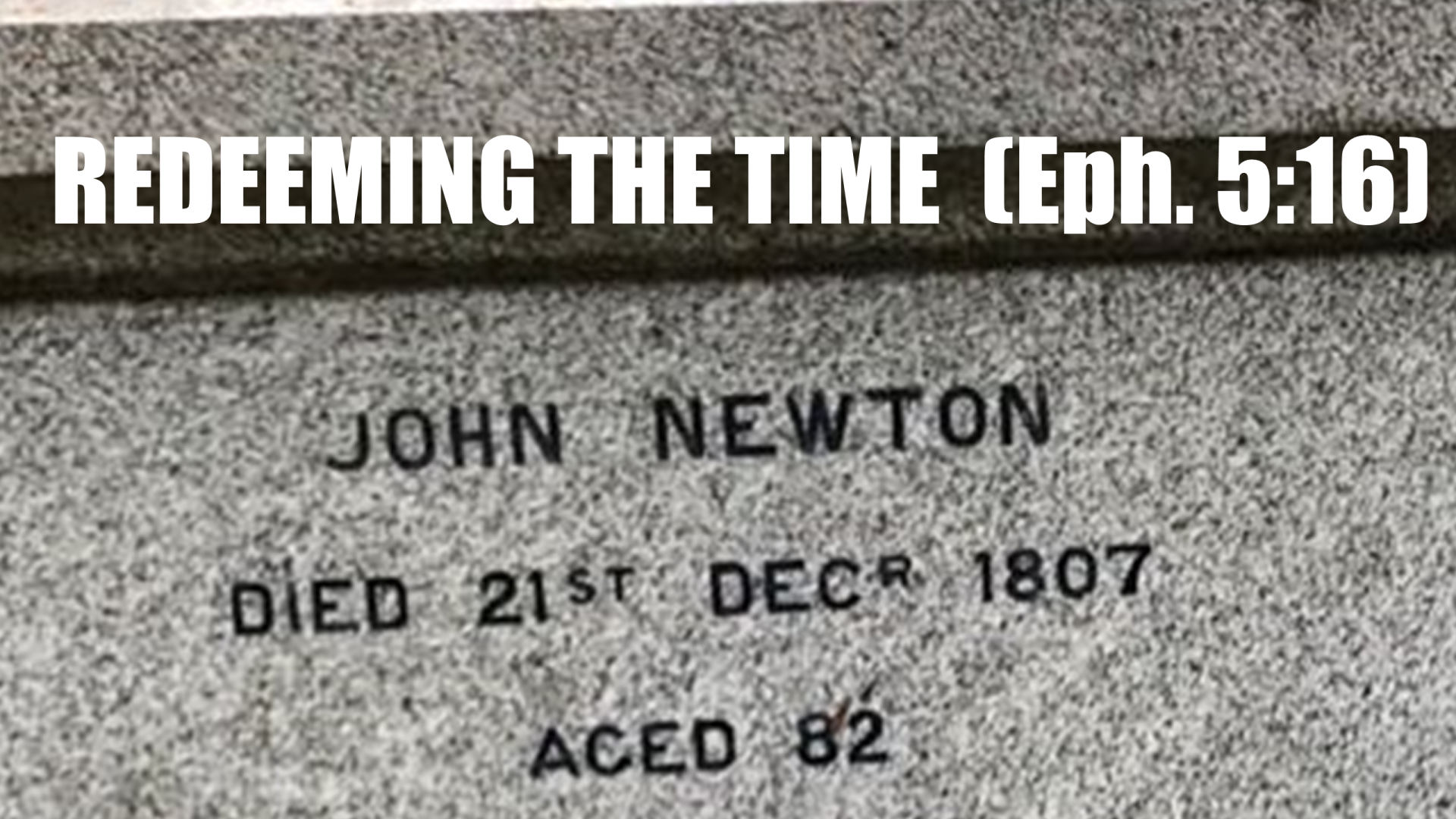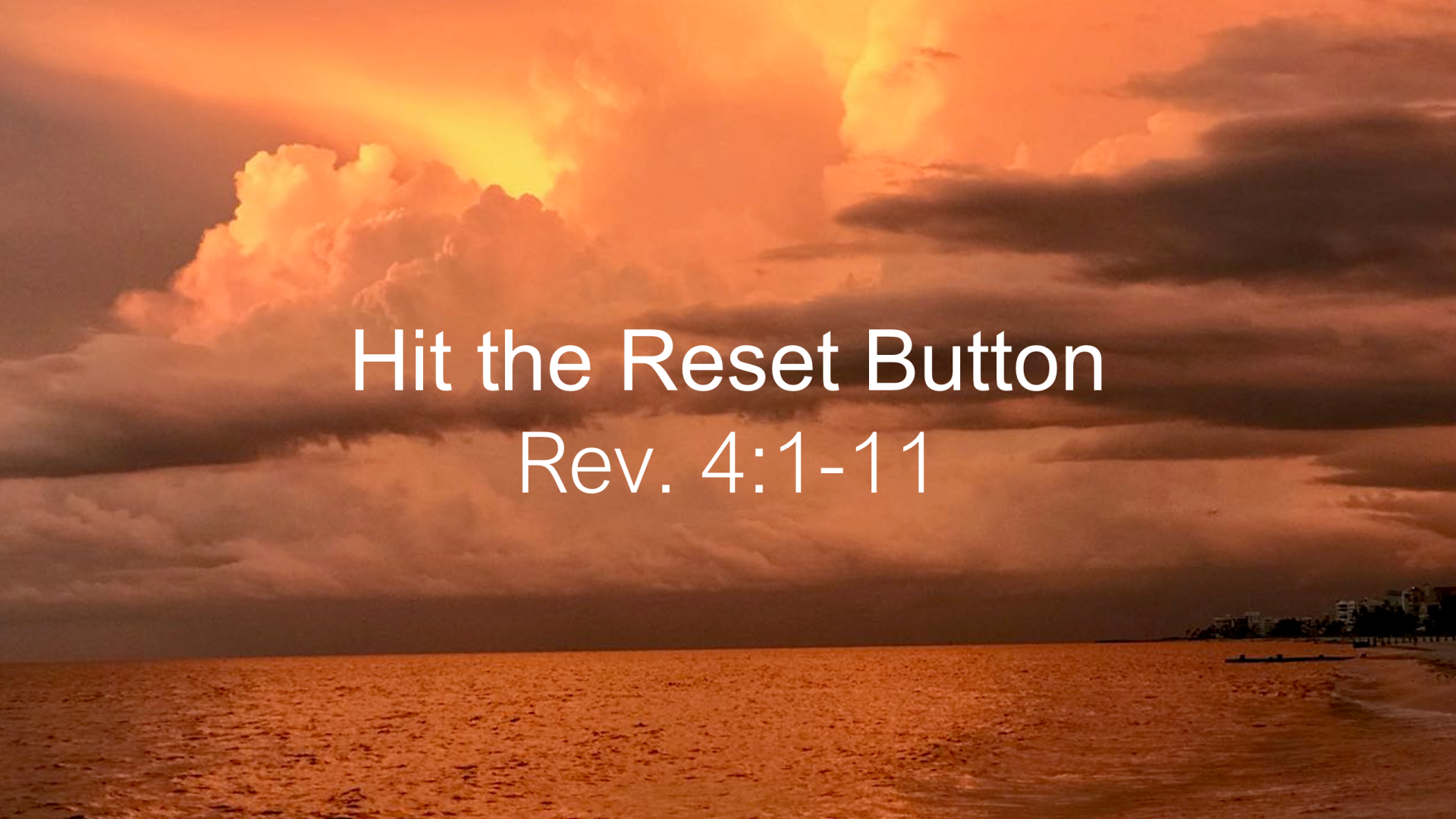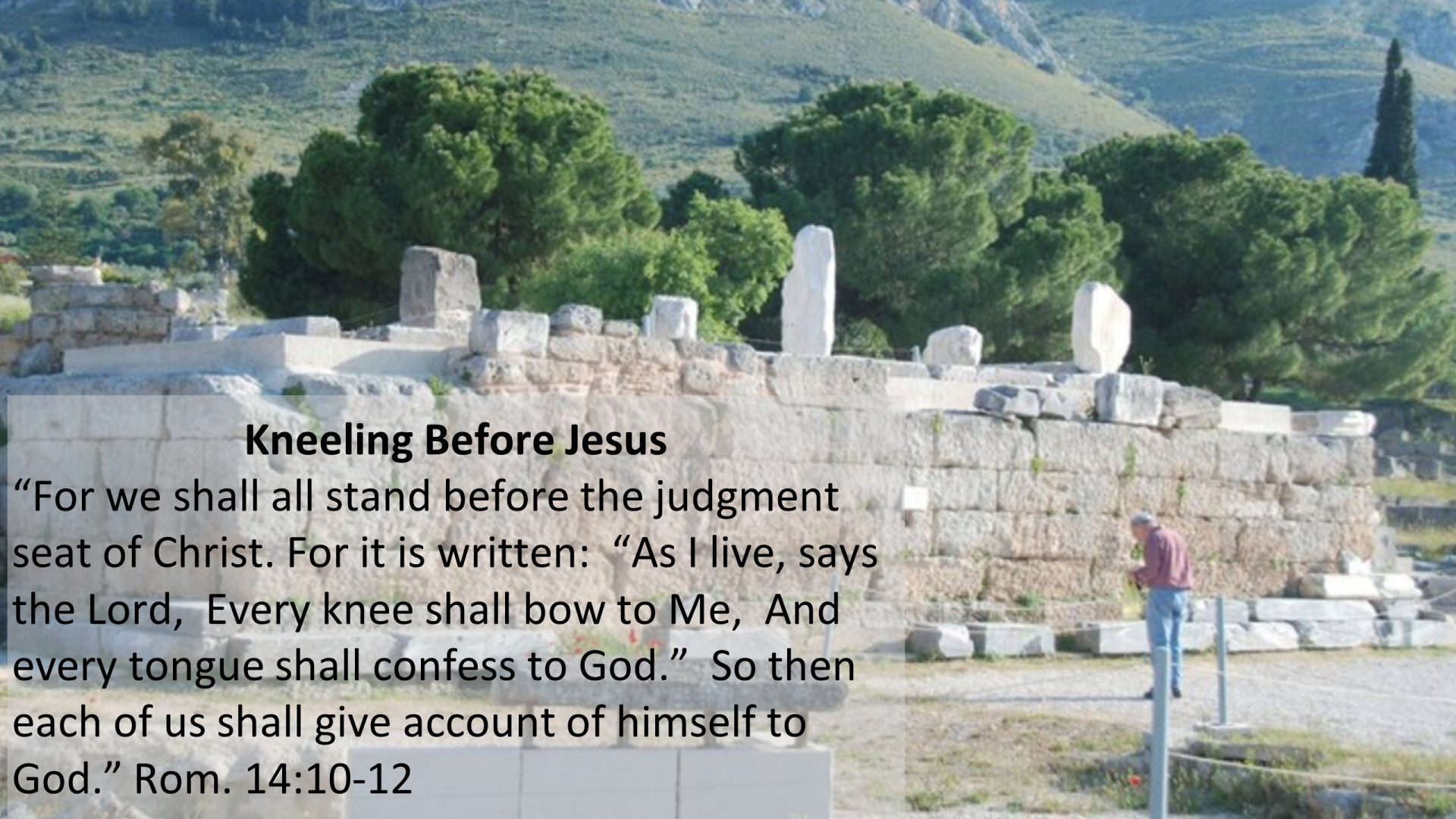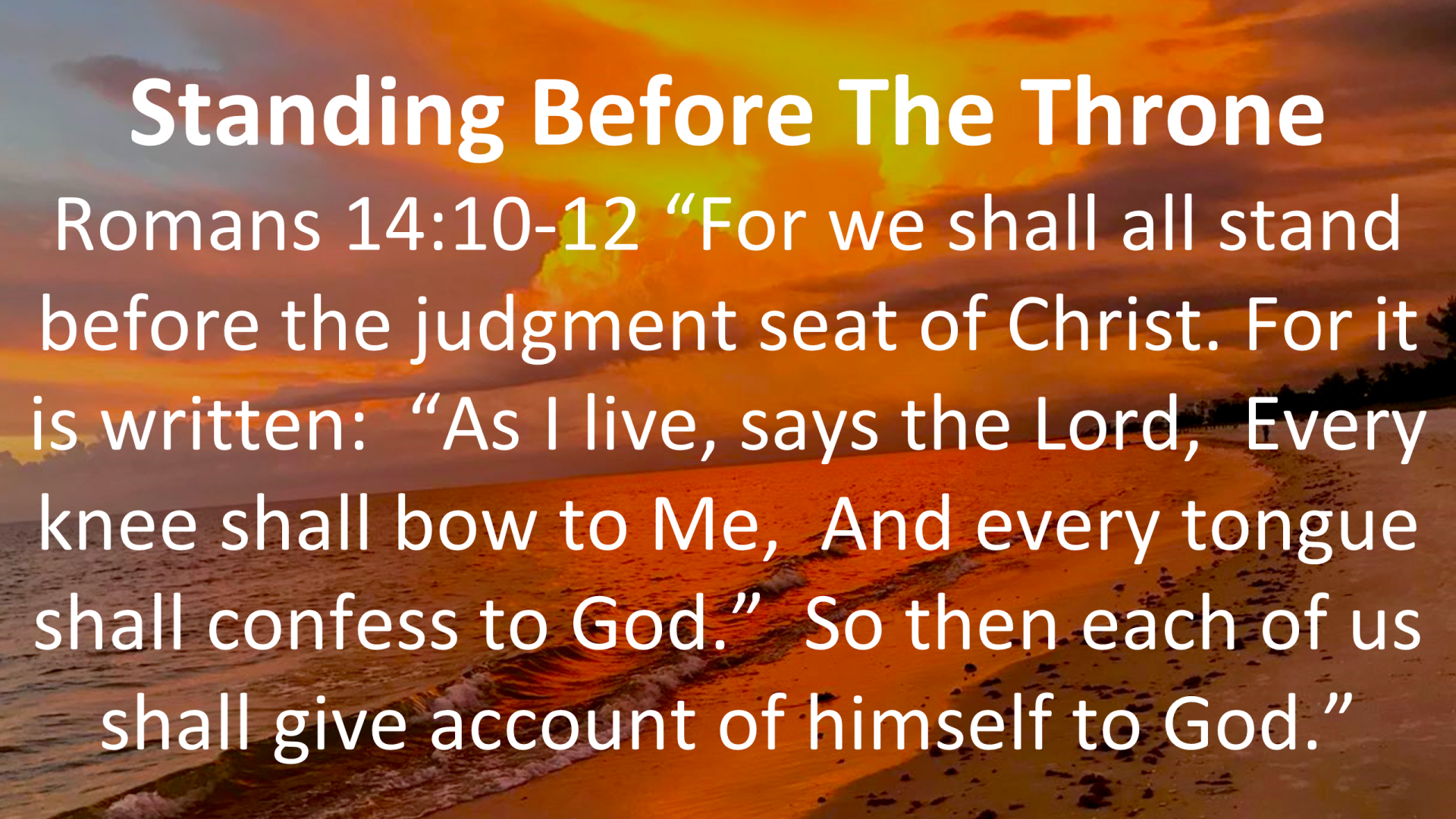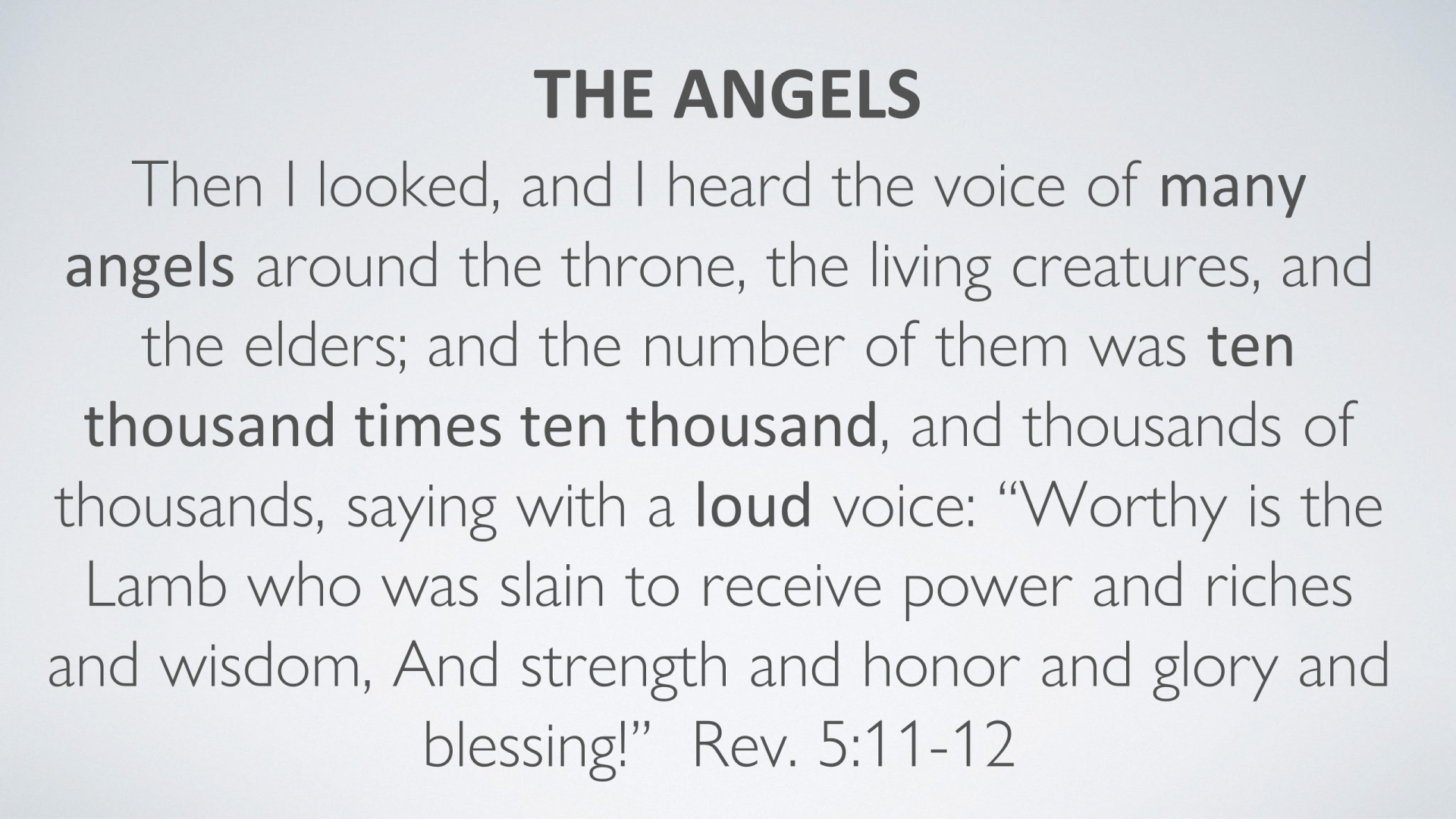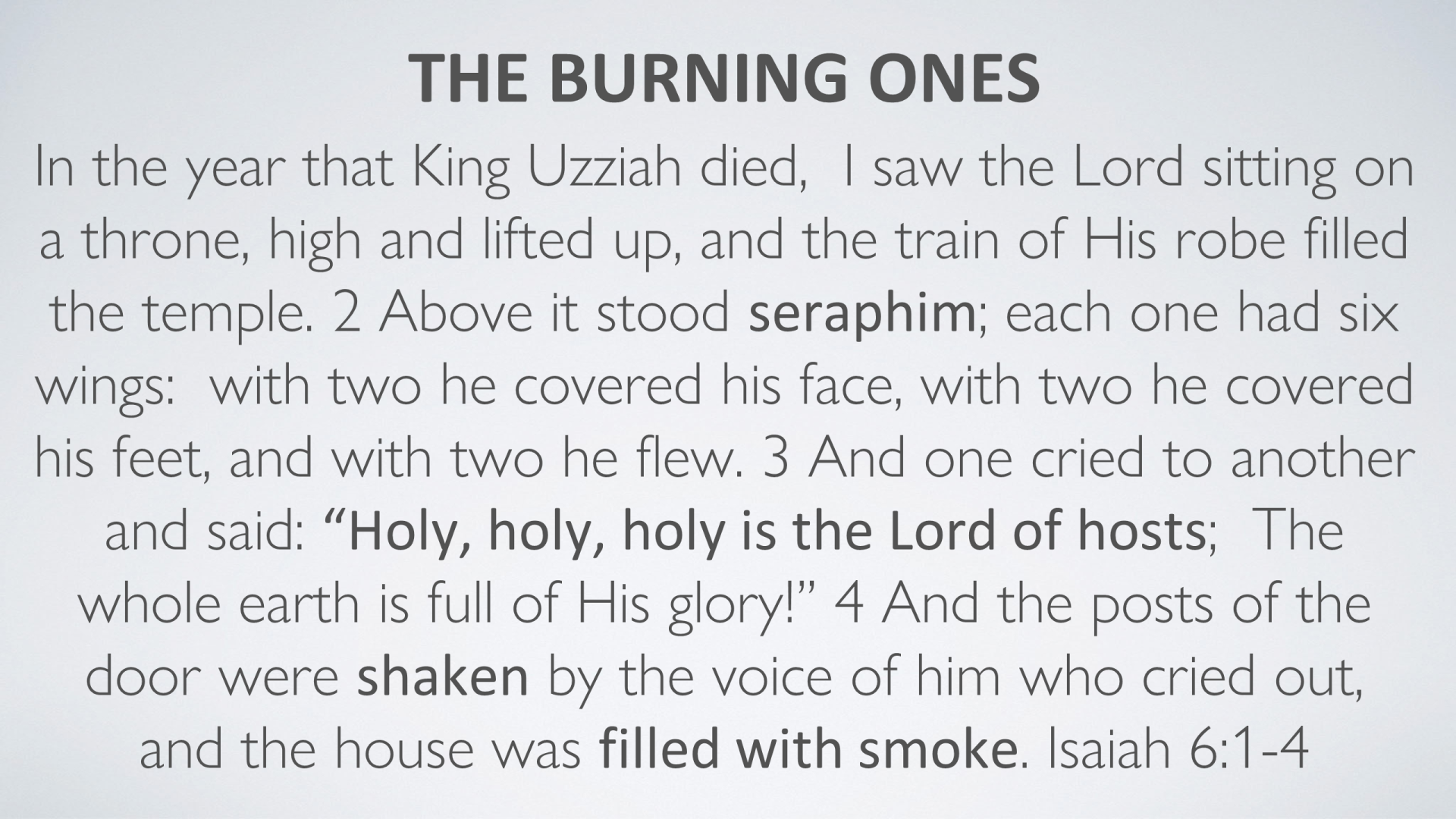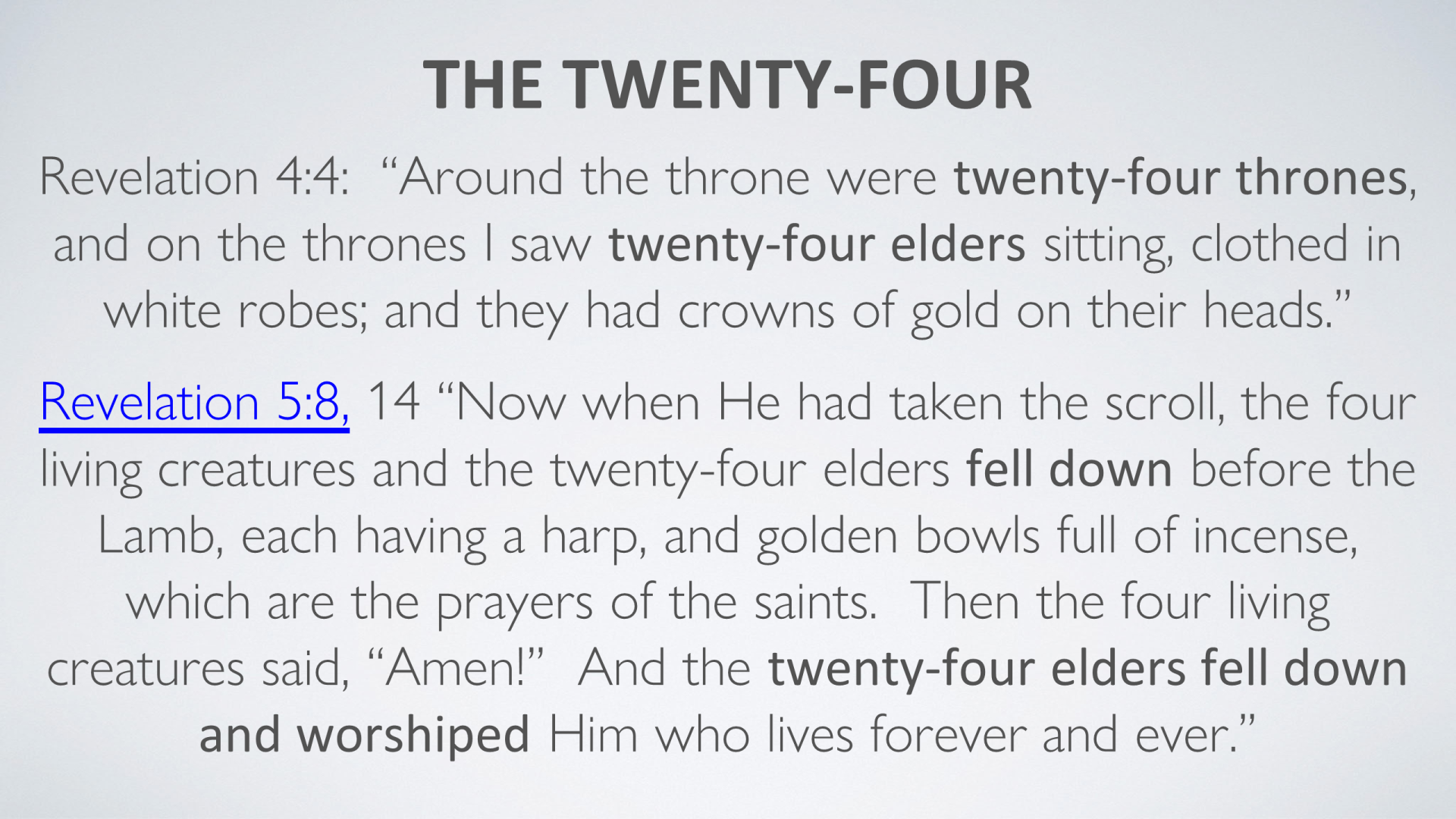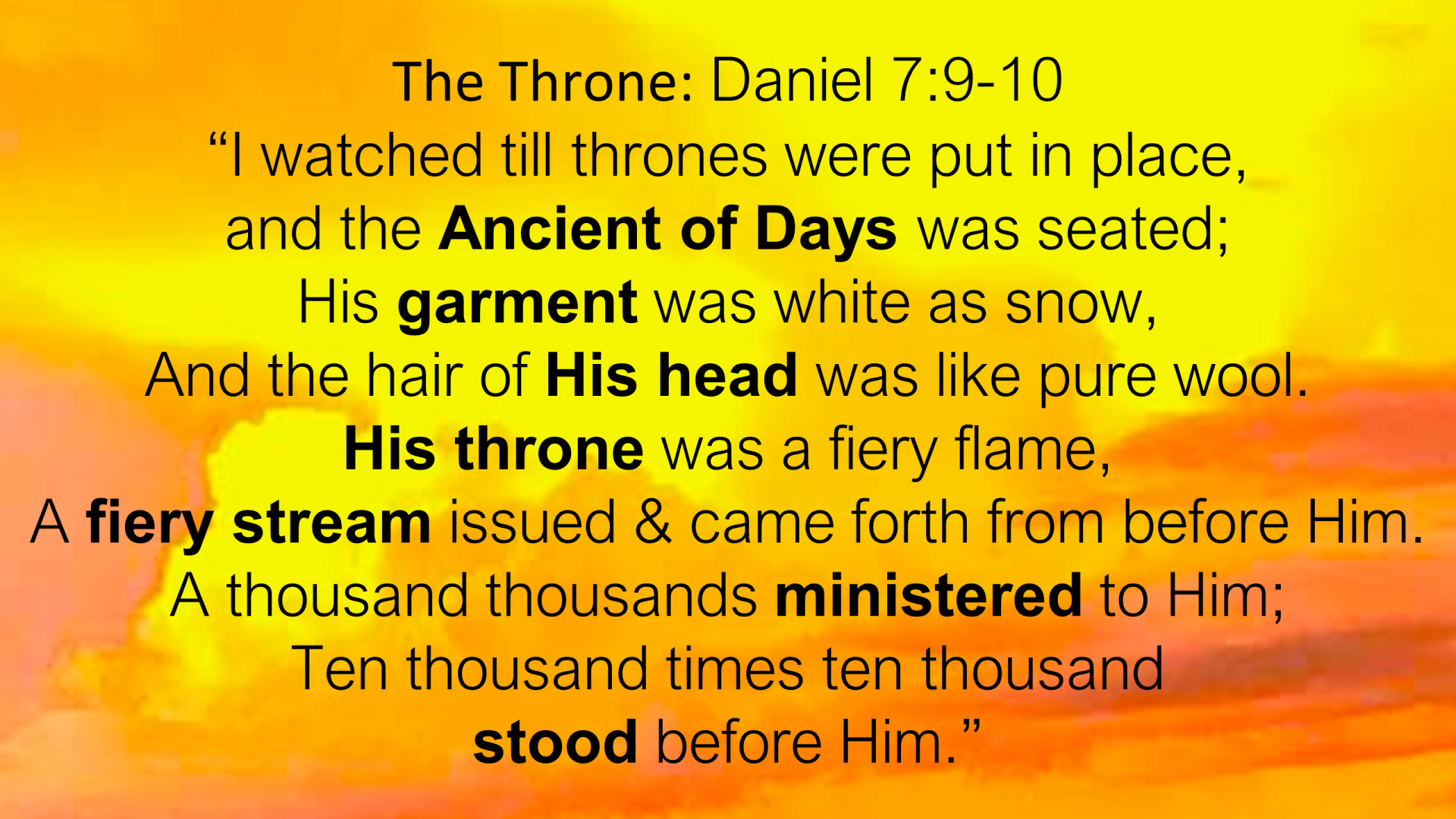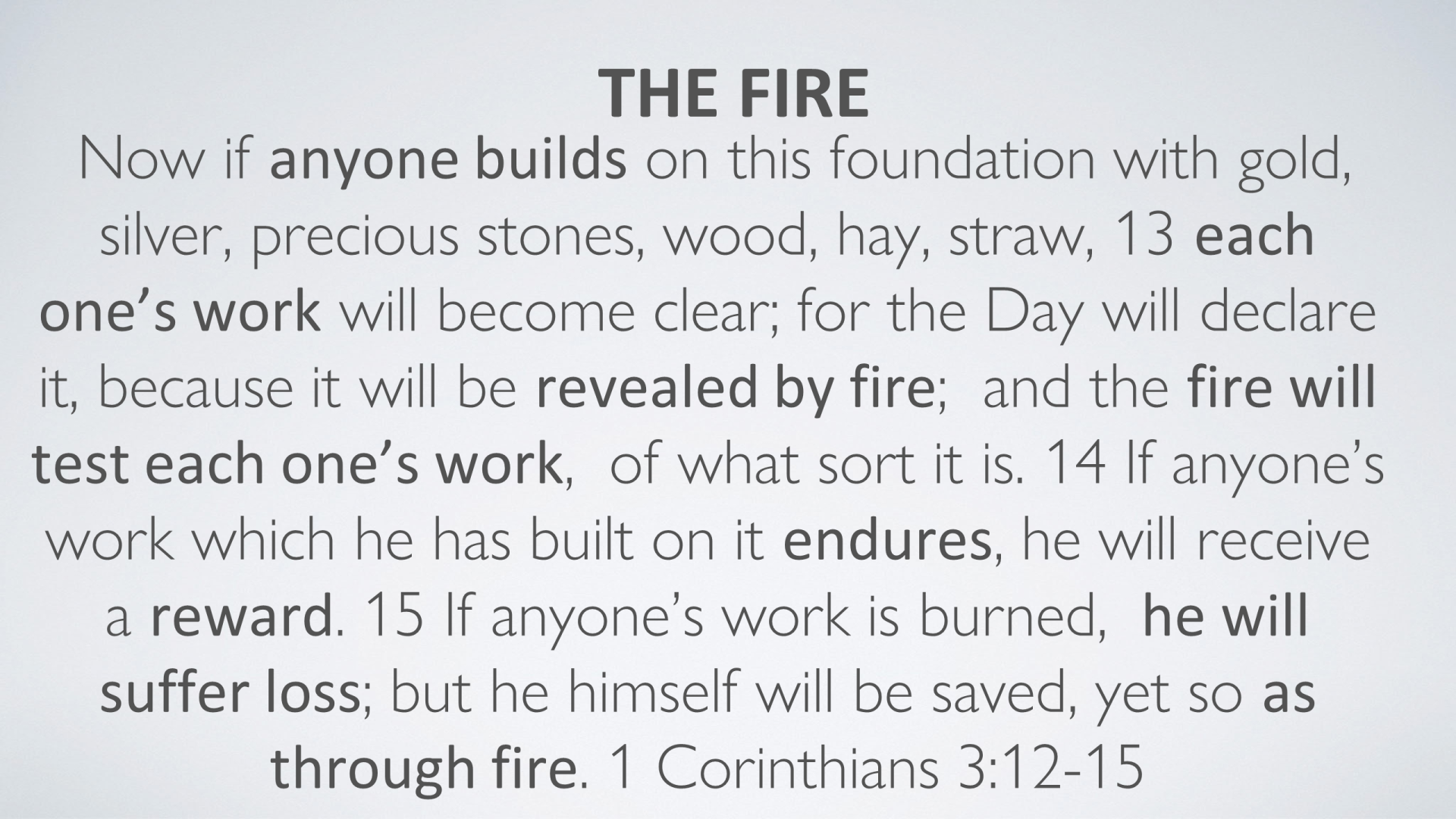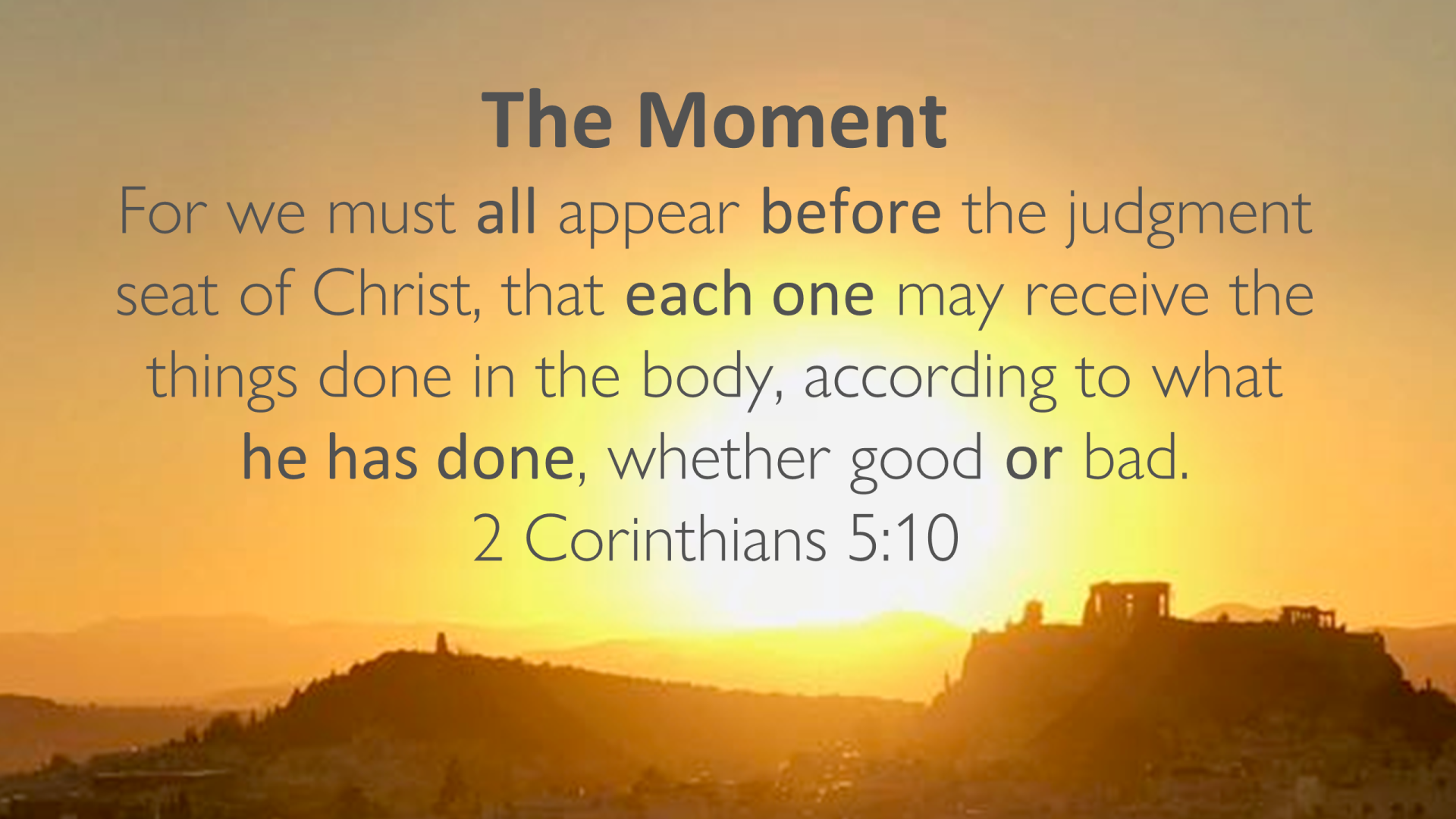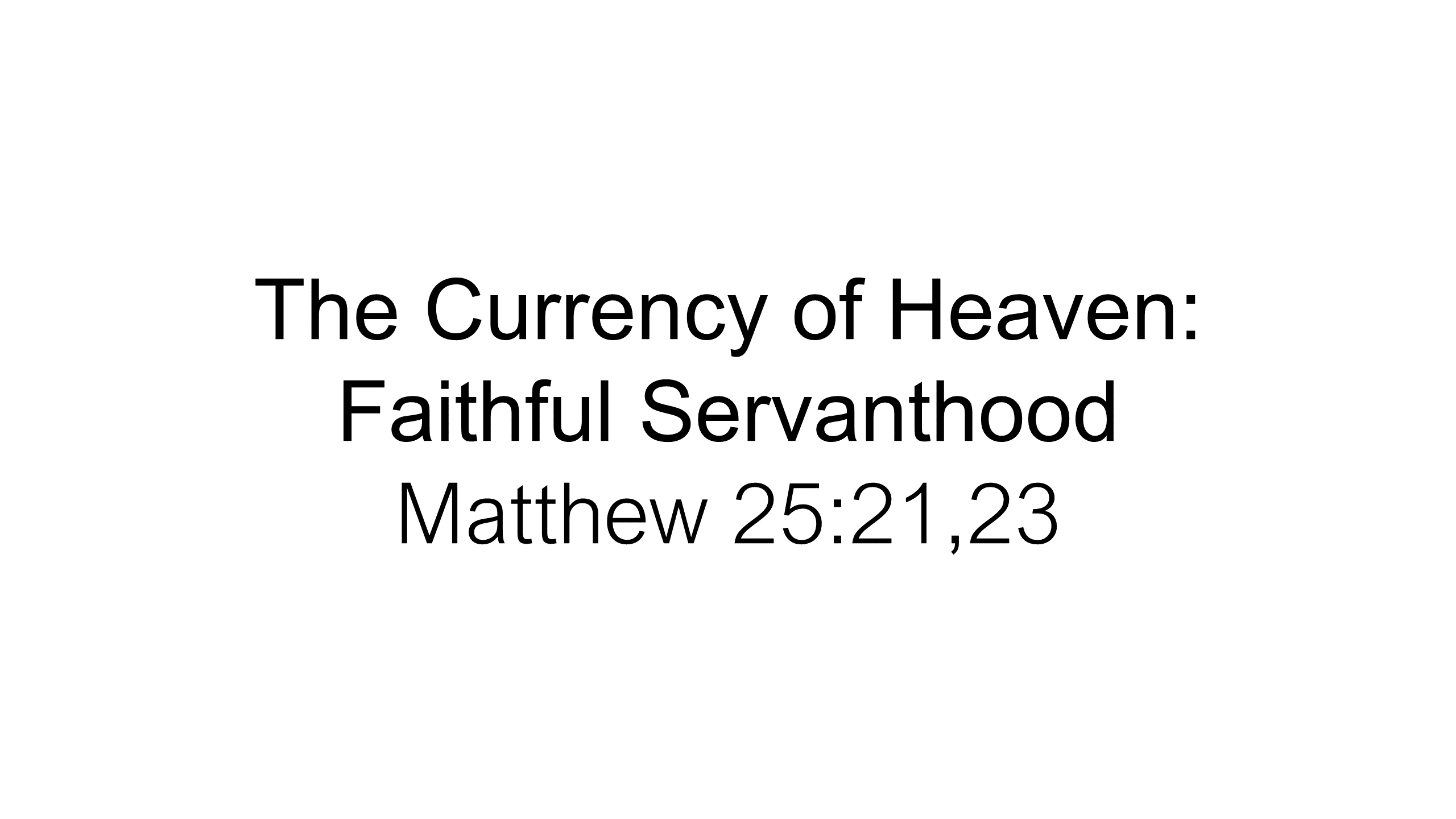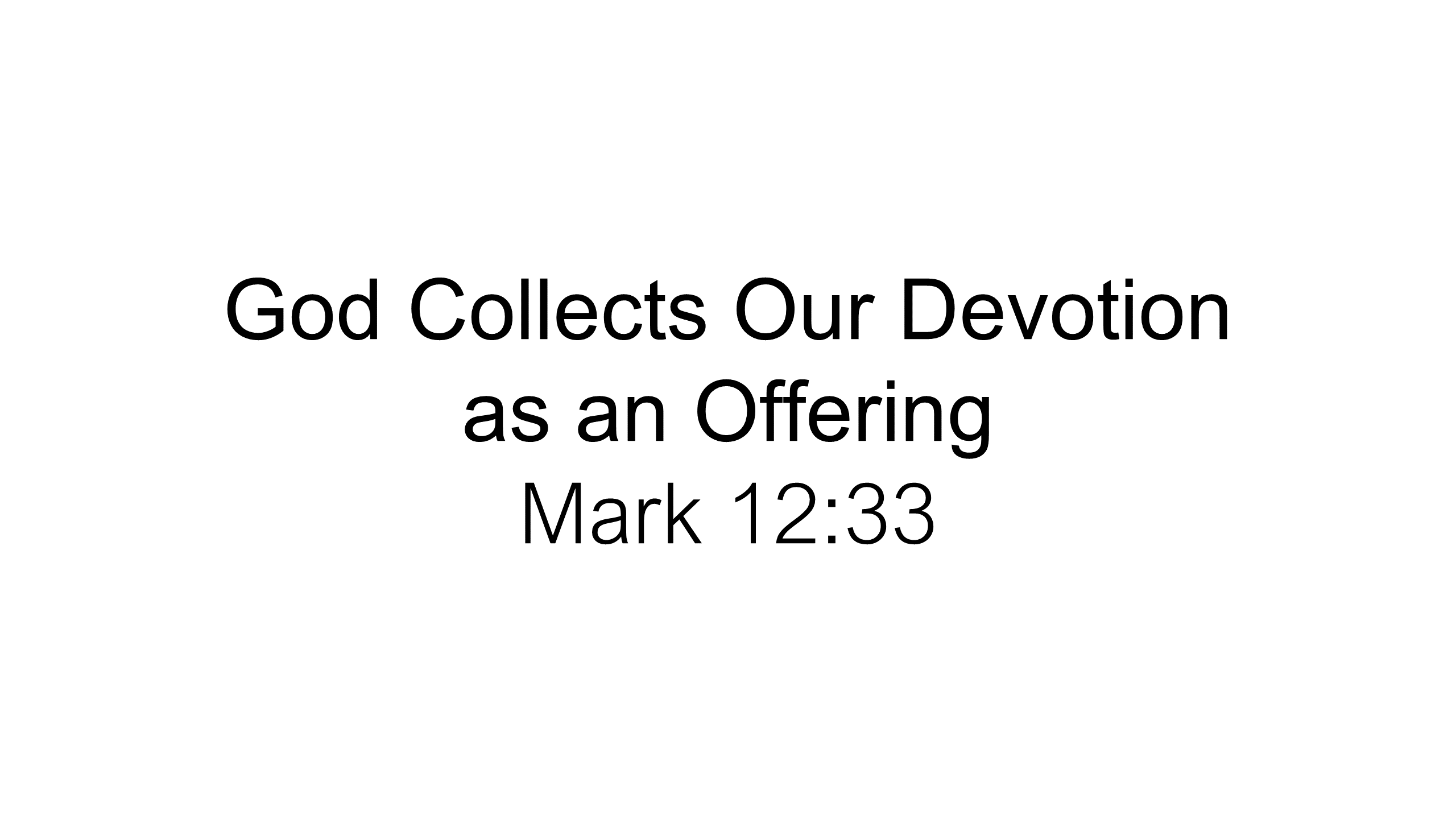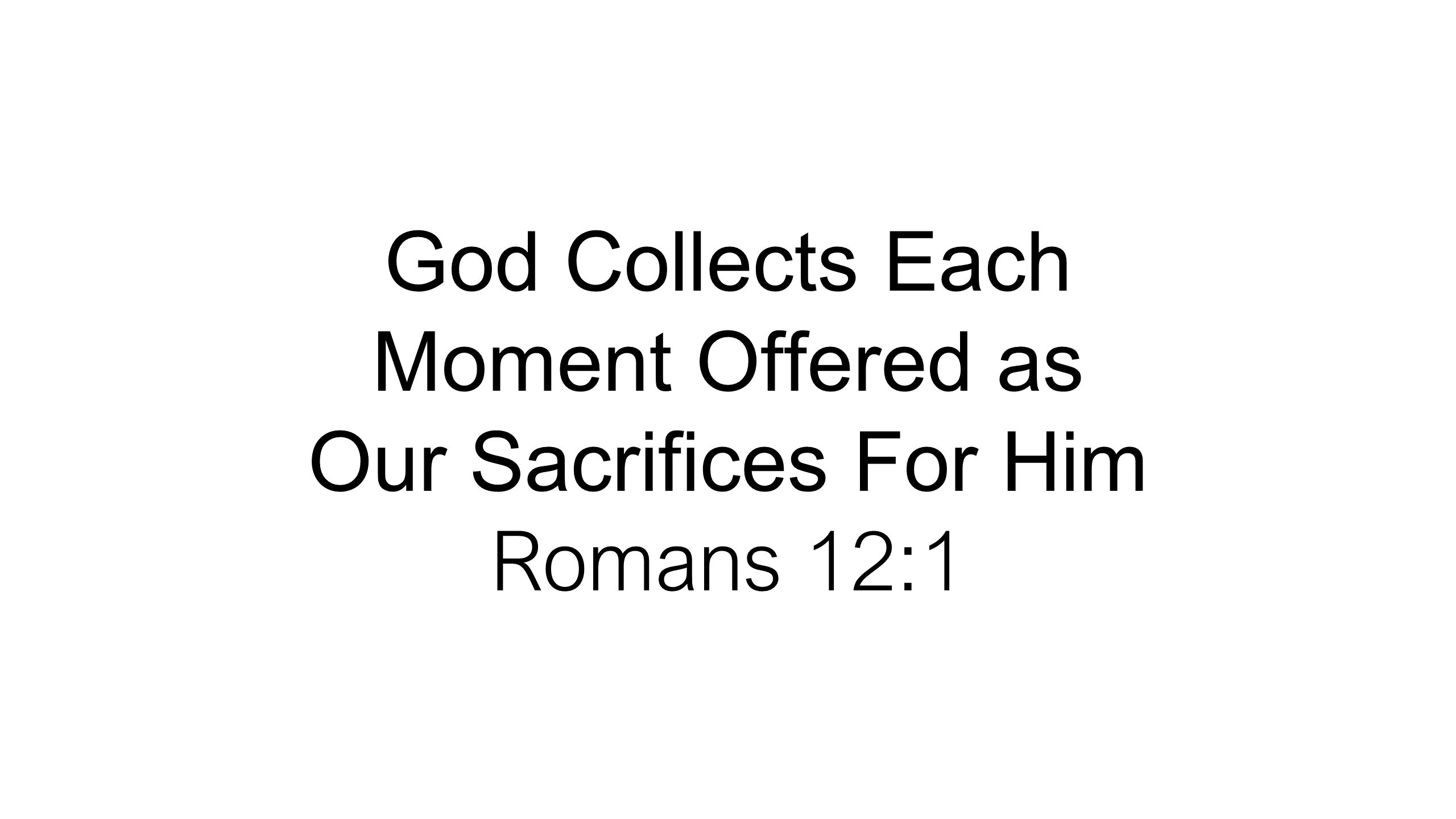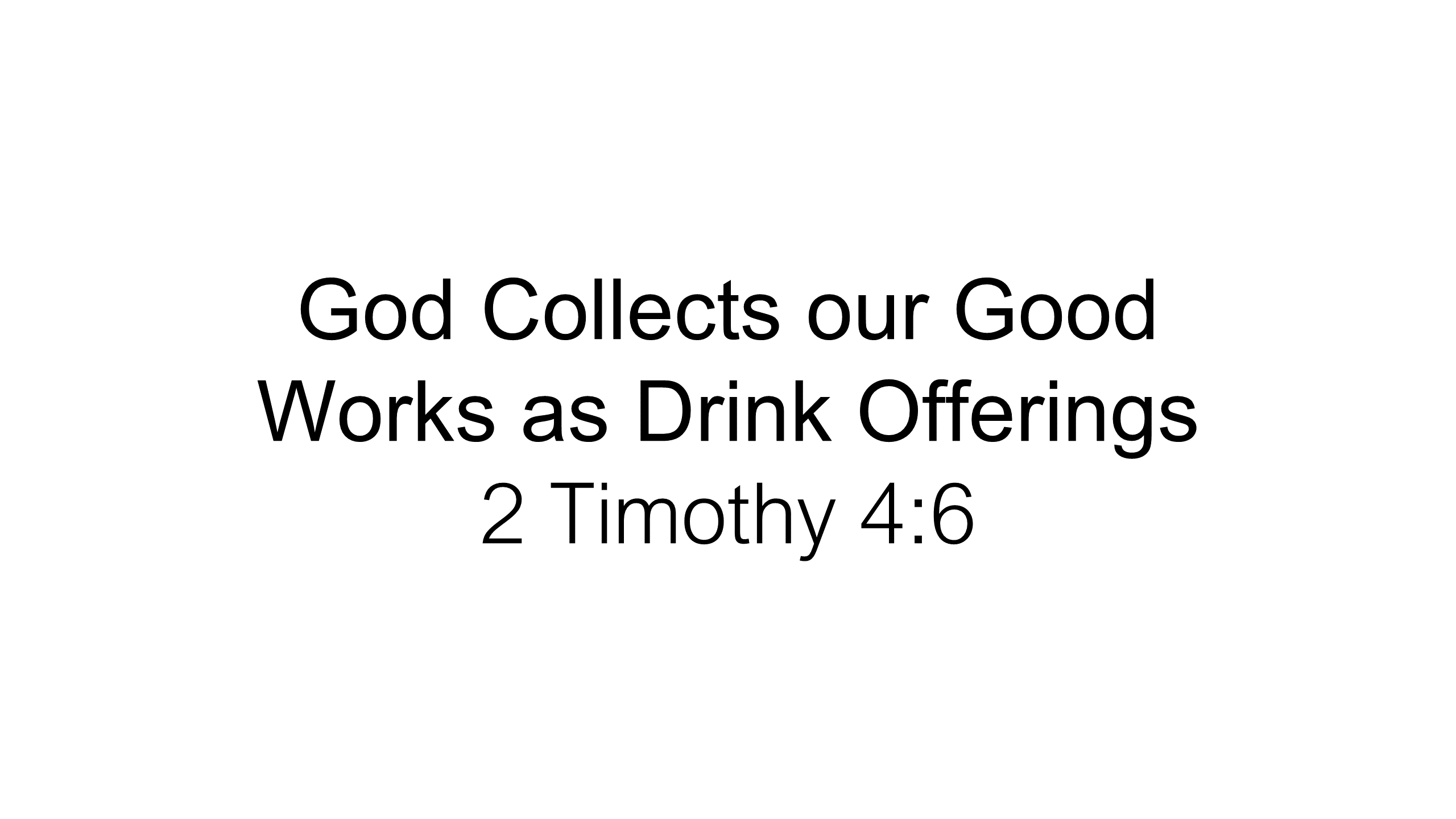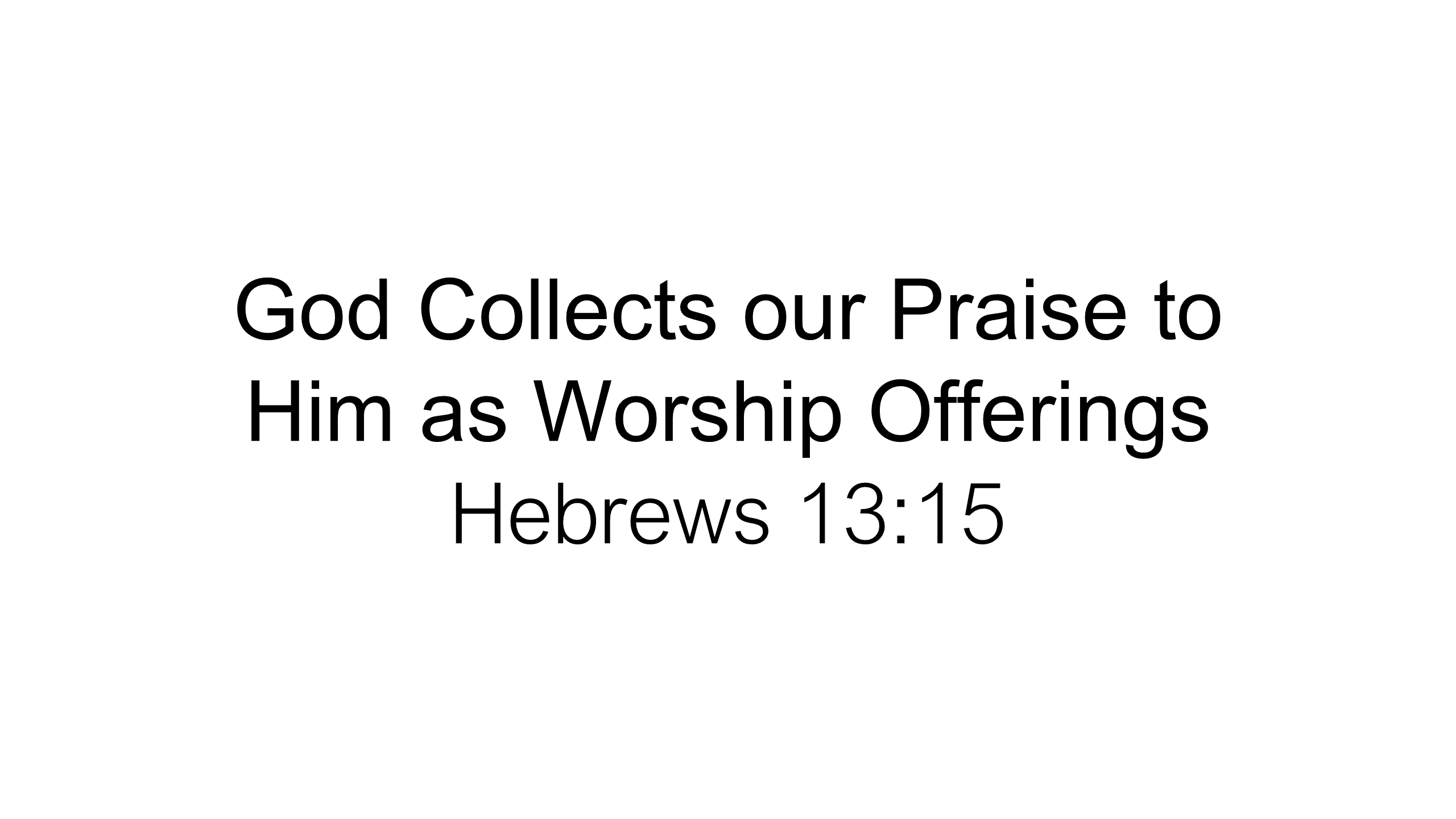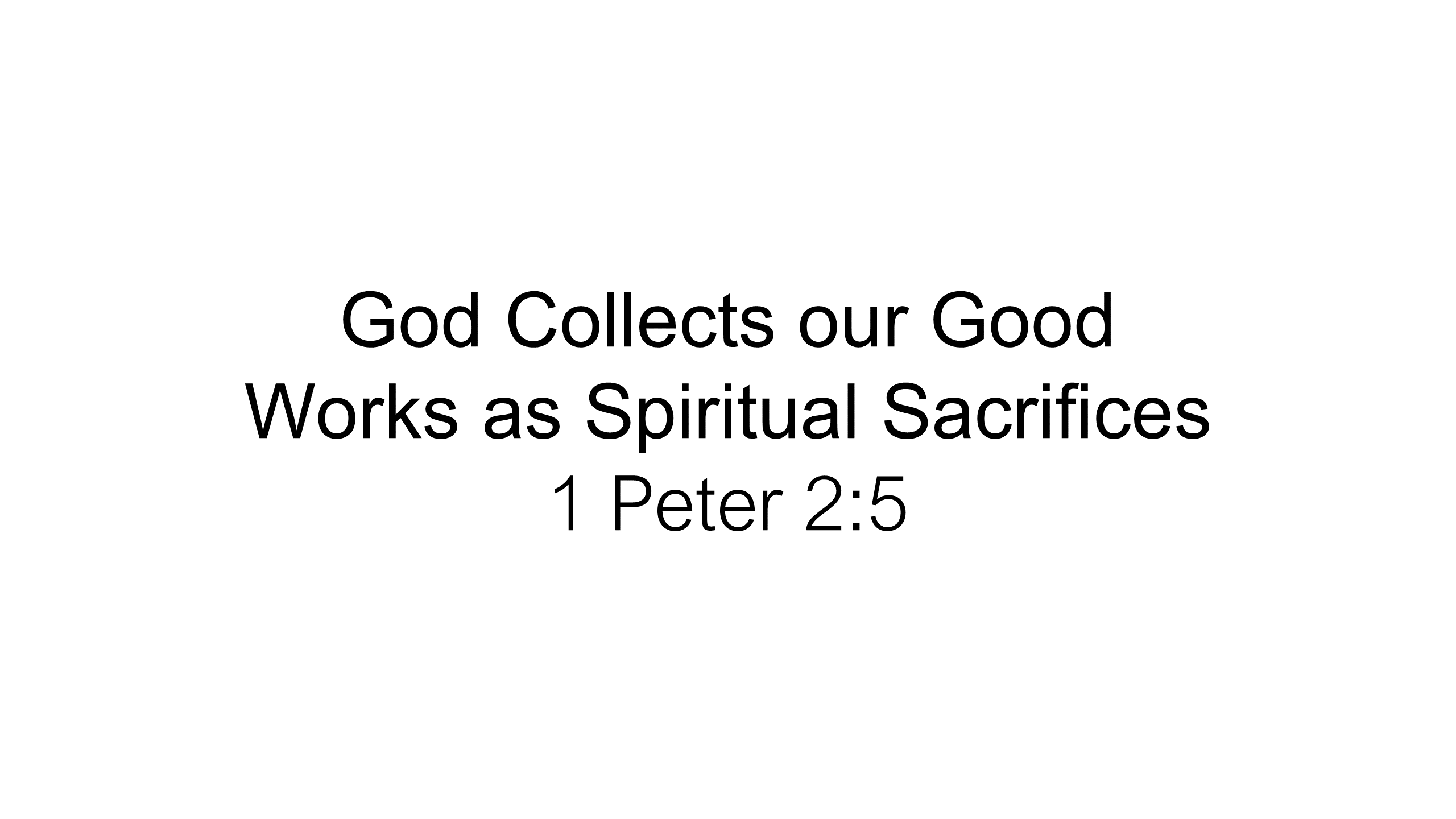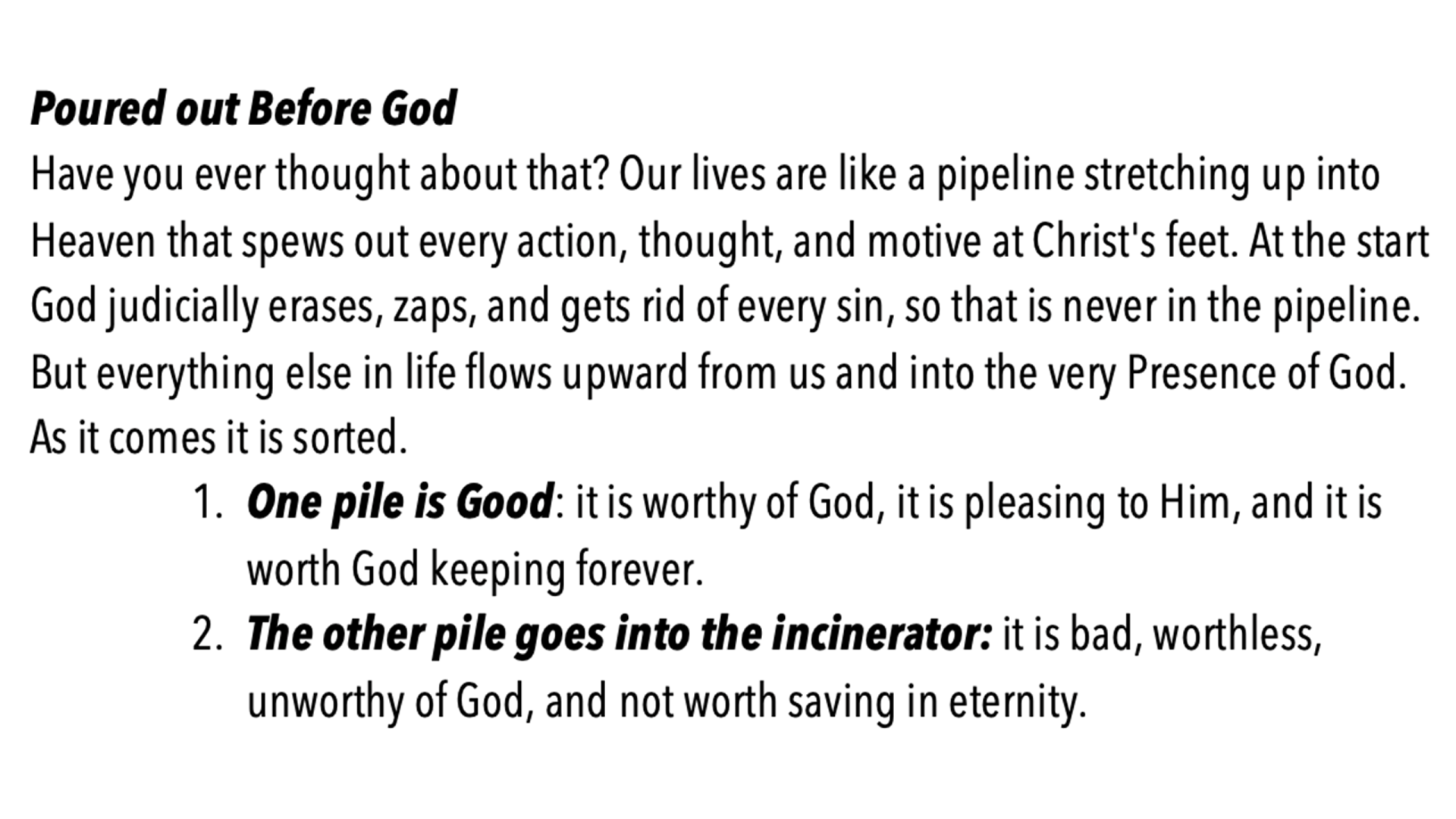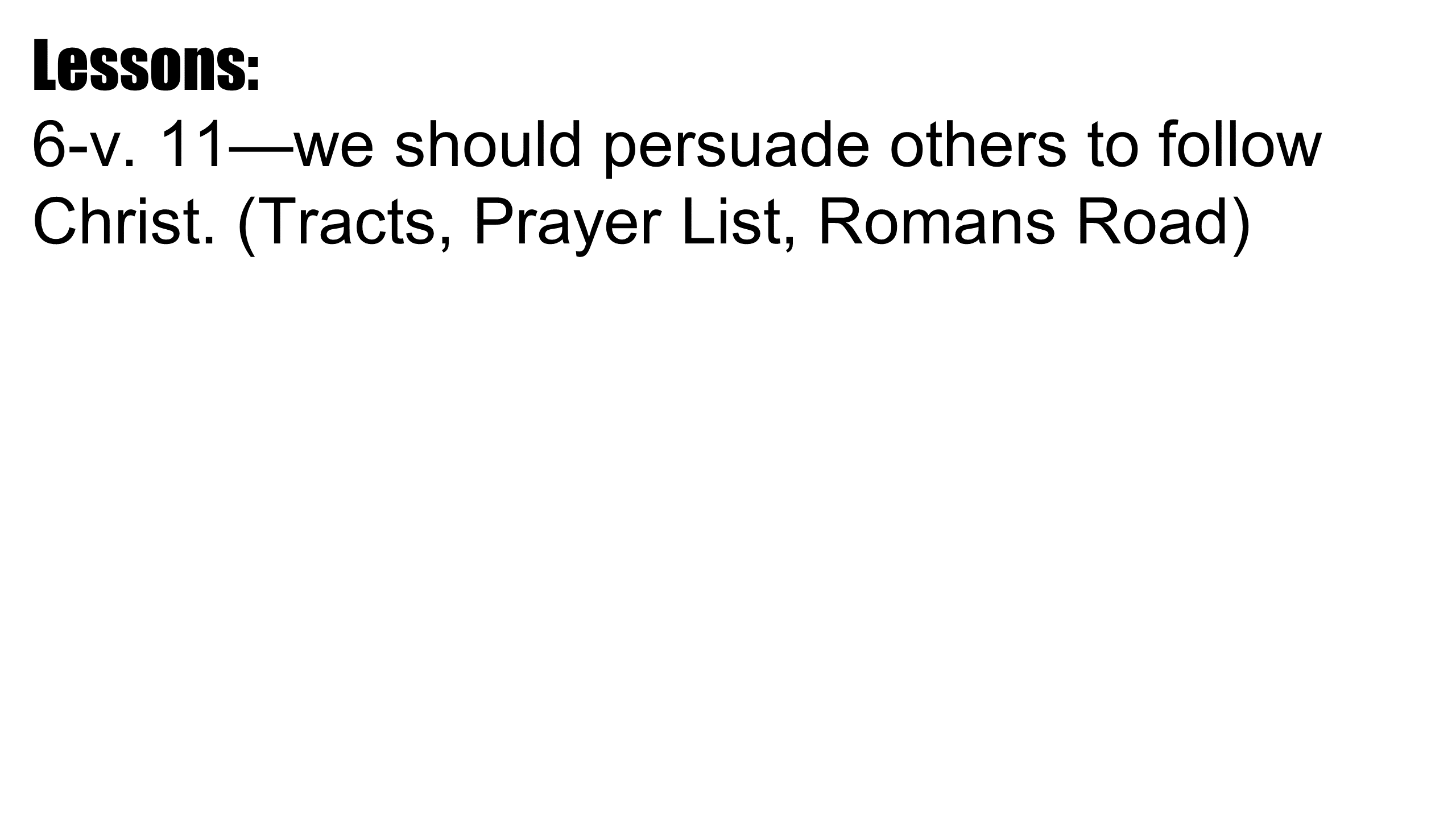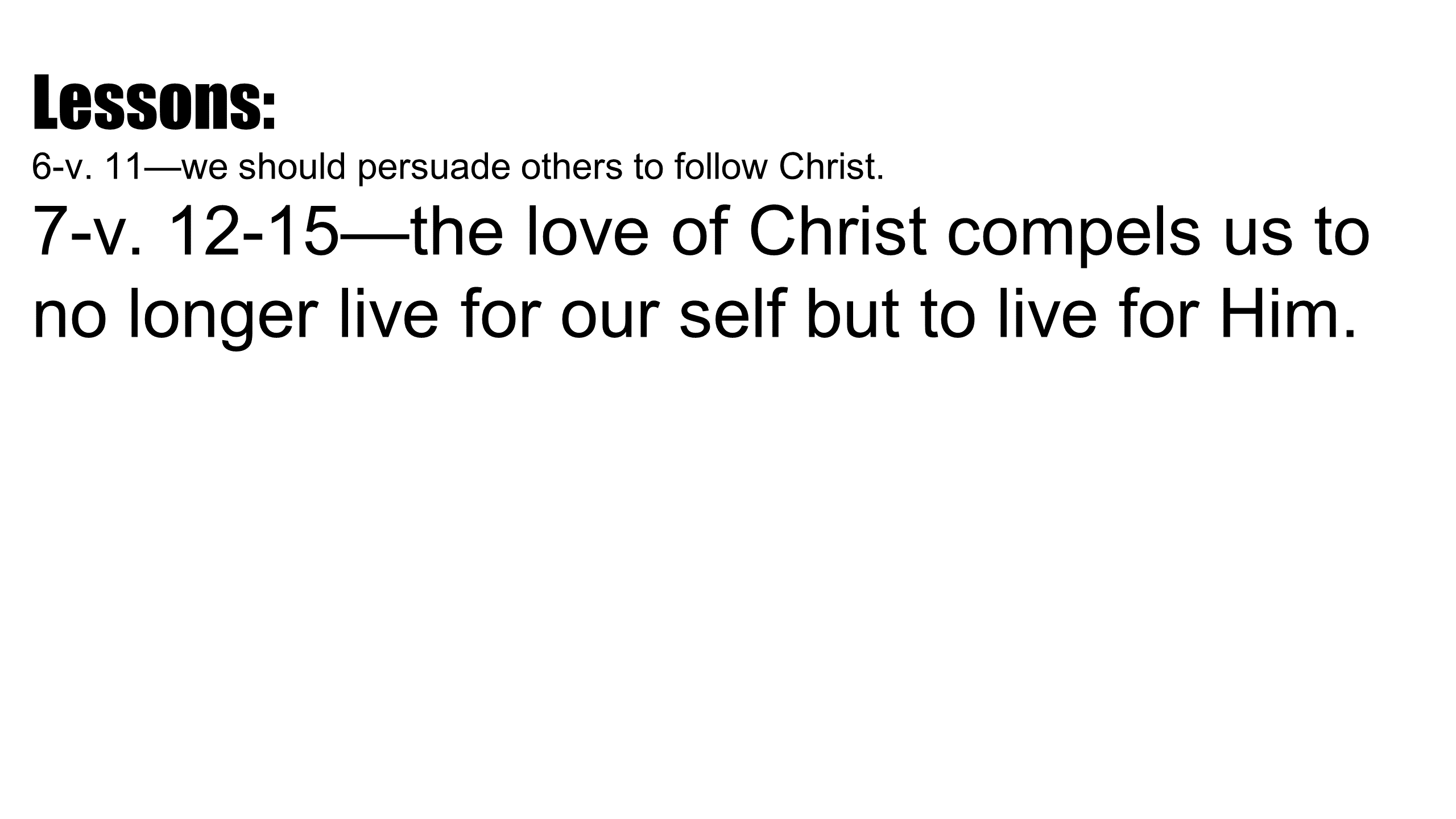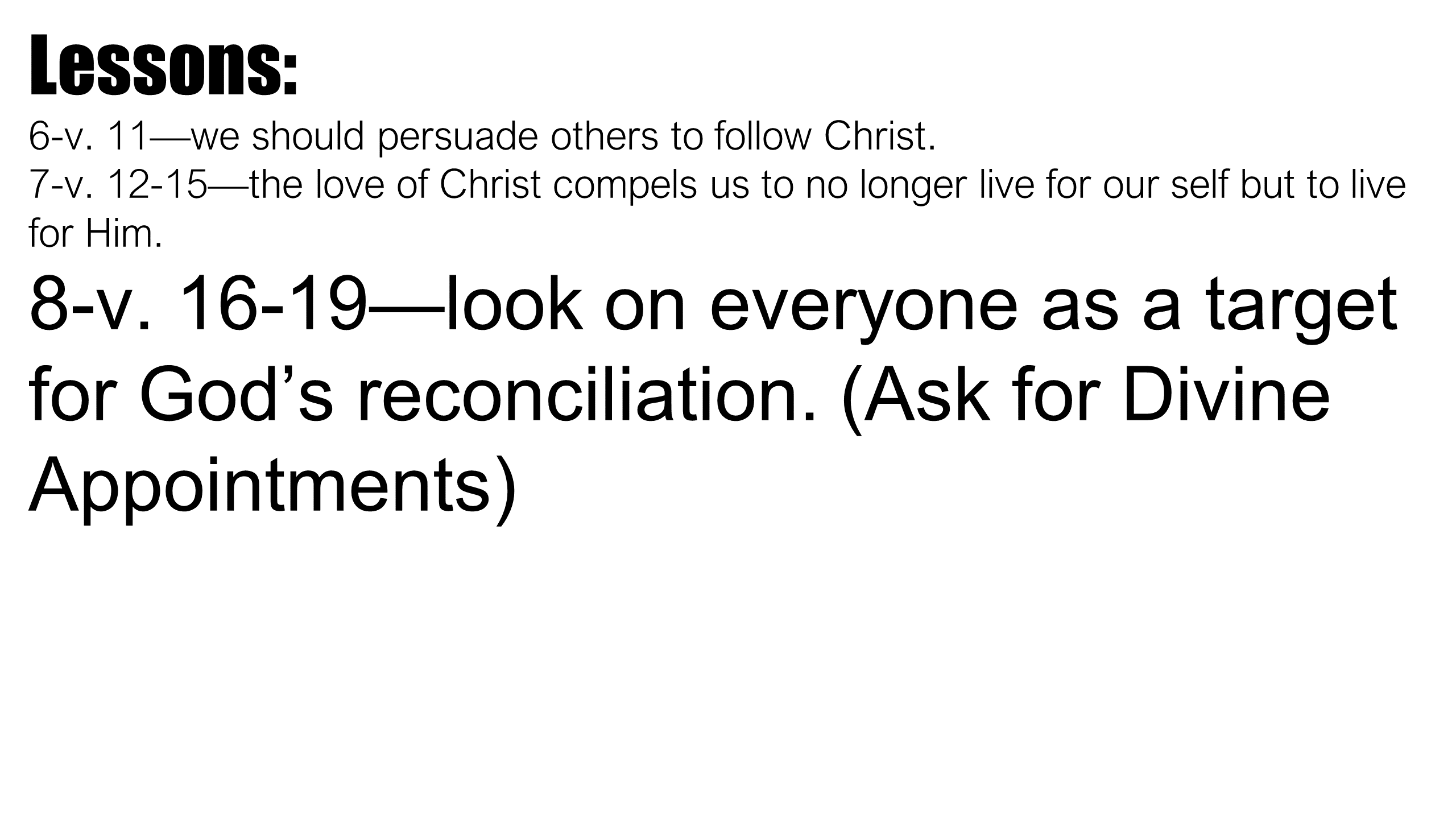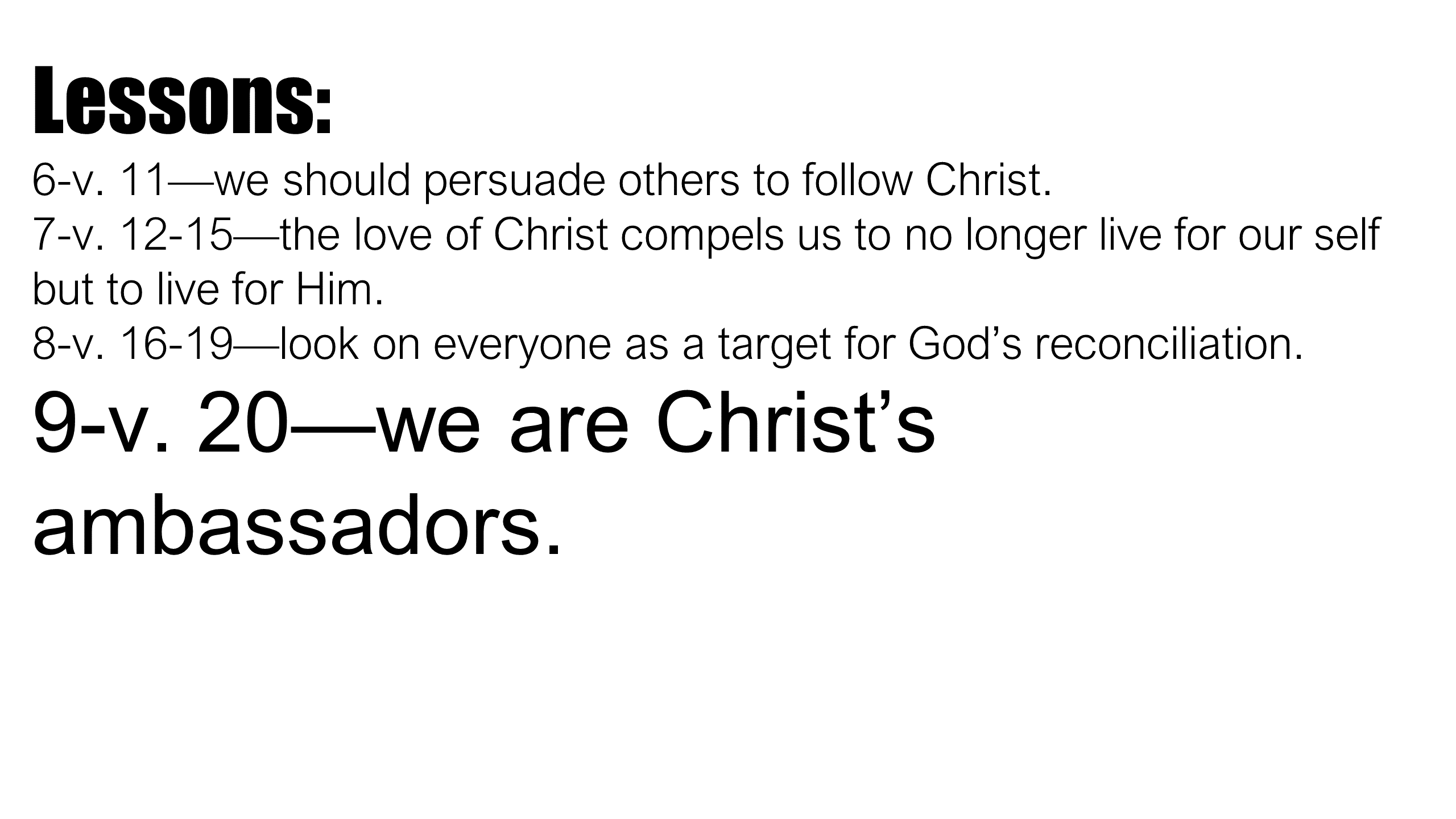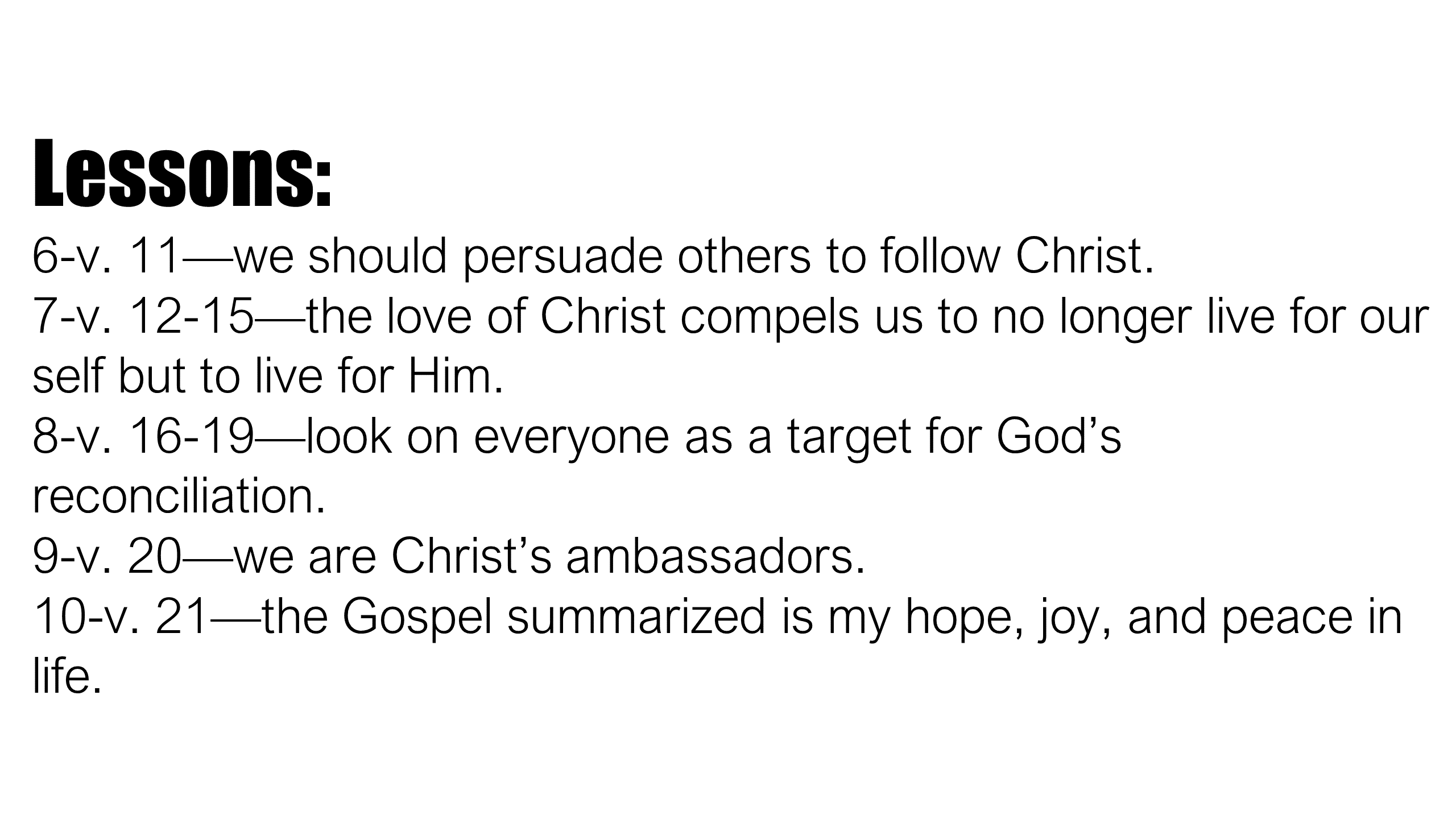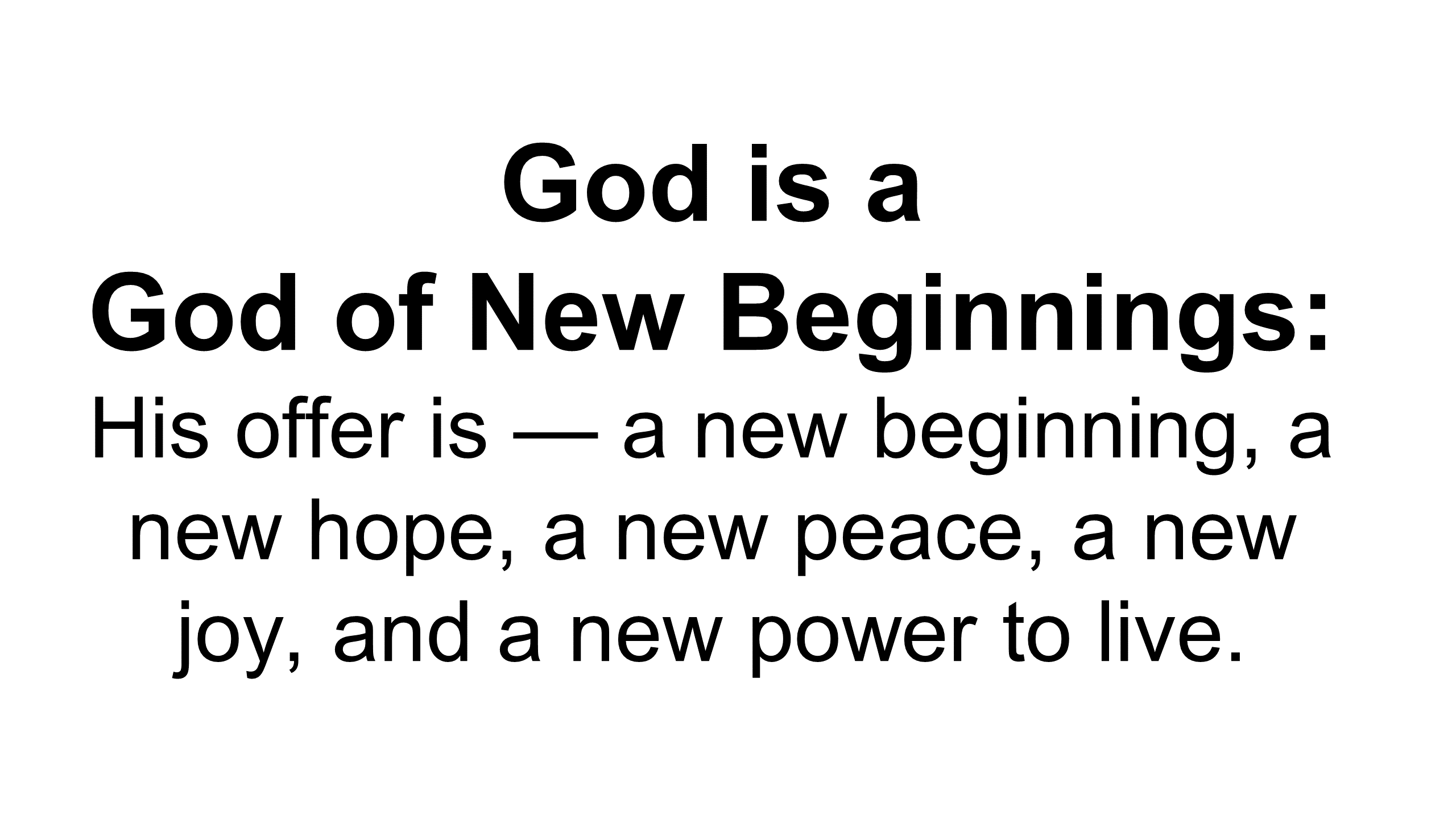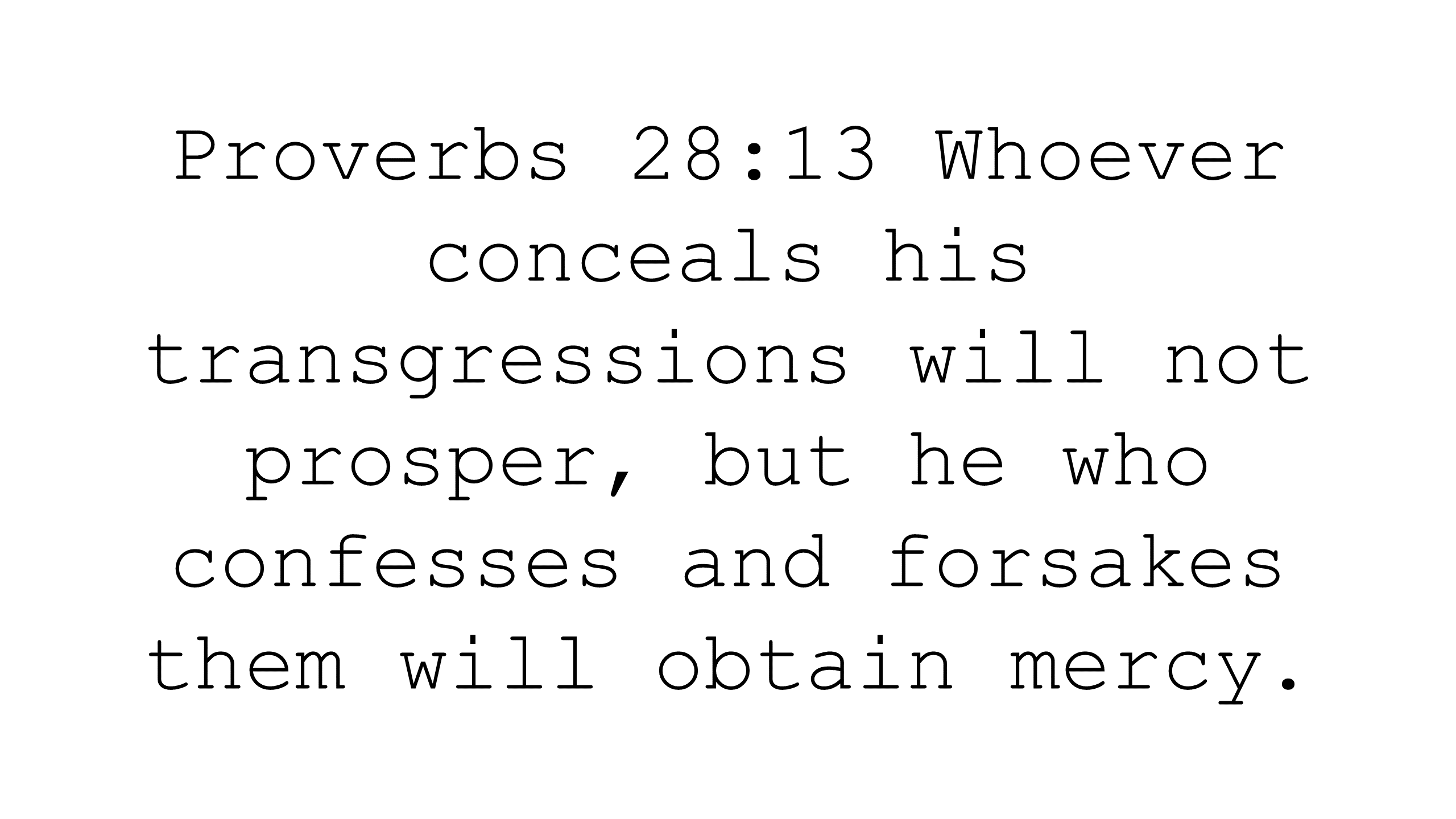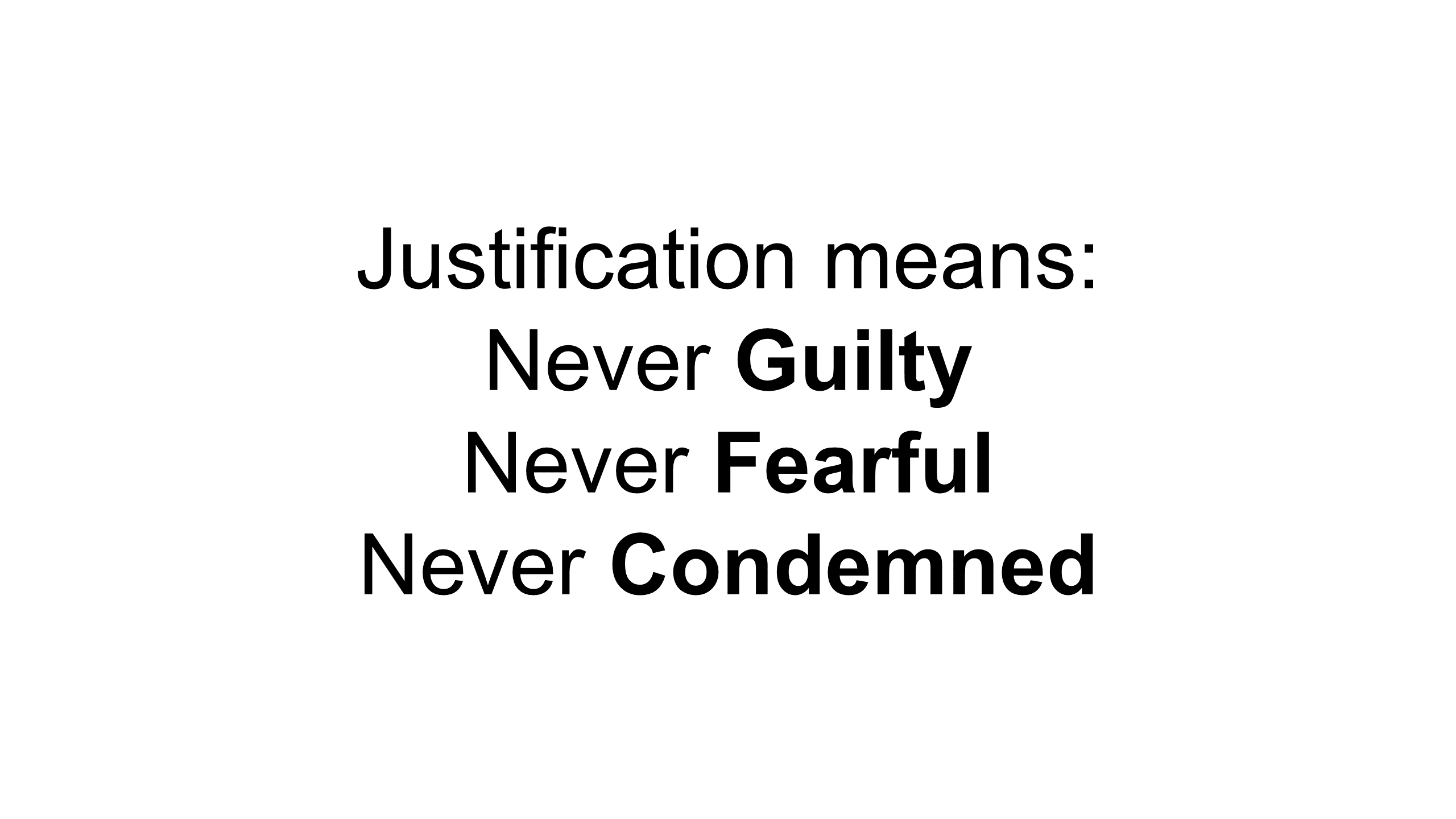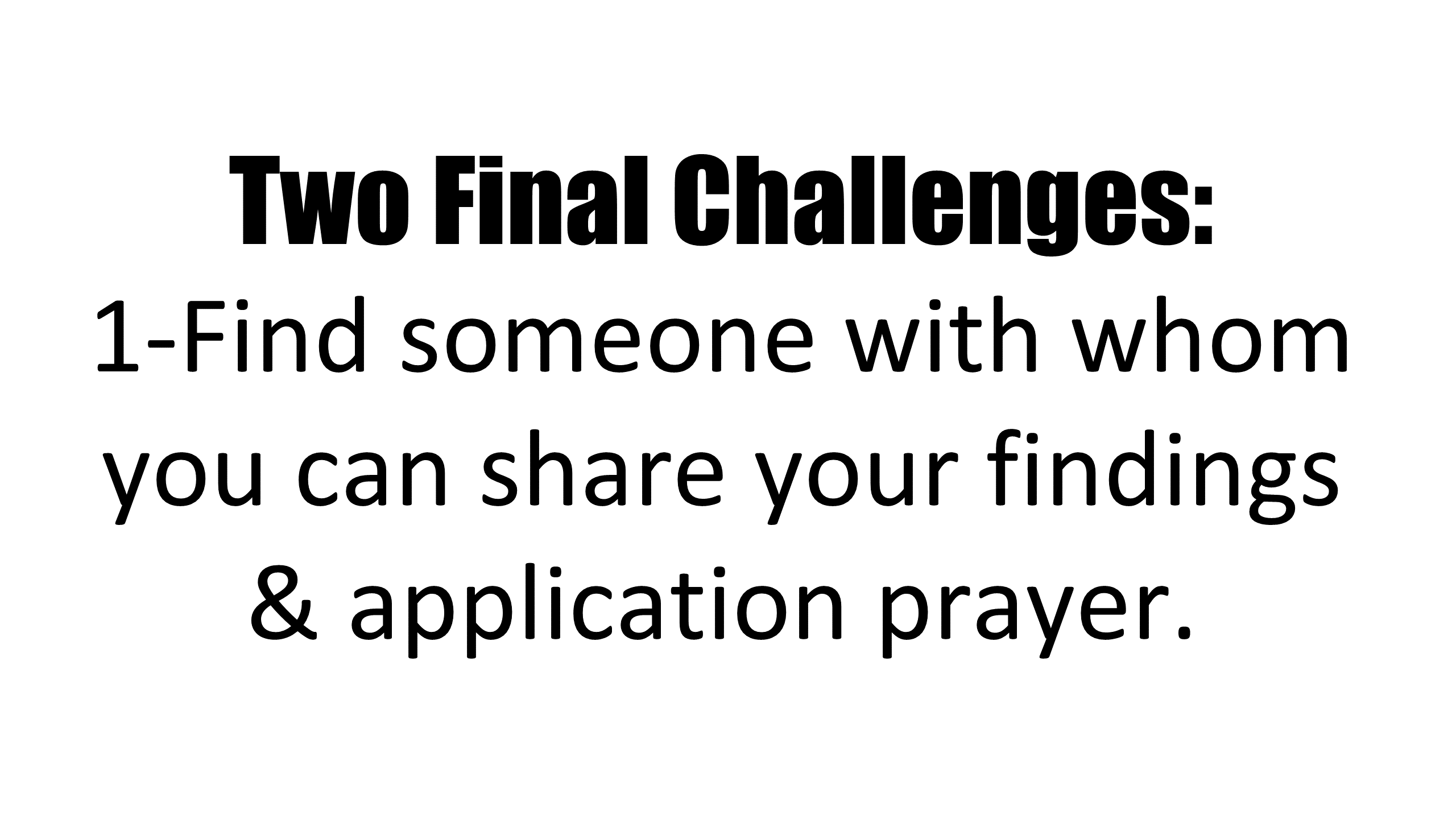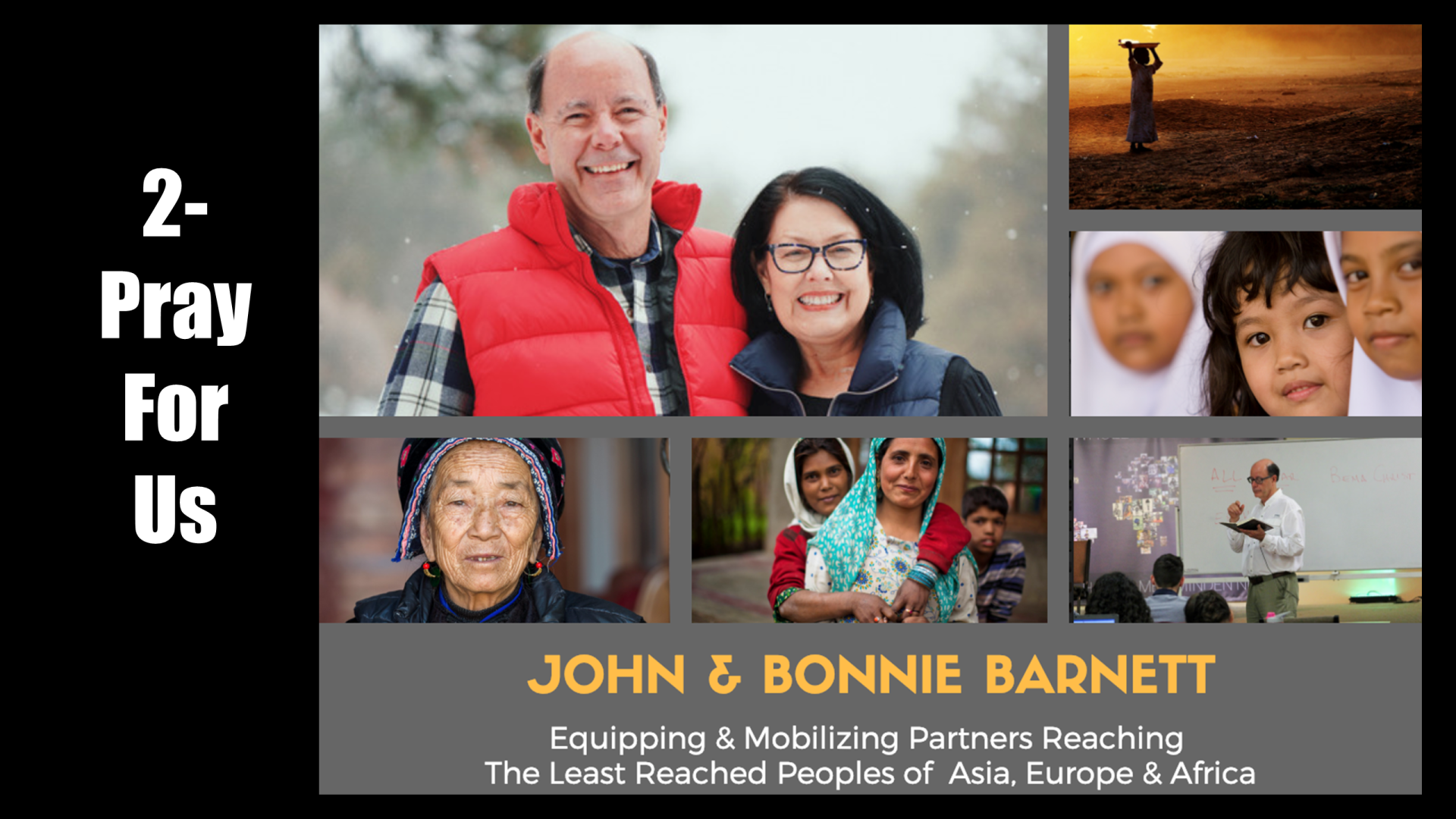If the YouTube video above is not available, here are two other ways to view:
How God Saves Us
FTGC-40
211118AM
Transcript
Welcome to the 40th week of our 52 greatest chapters. You’ll notice that we’re studying 2 Corinthians chapter 5 and there are three lessons I’m going to show you today. This study that I’m sharing with you is what I have found this week. You might find different things, but I’m meeting with you like we’re at Starbucks or Panera. I’m going over with you what I found and encourage you as you launch into looking at this chapter this week. That’s the format that we follow as we go through the Bible. The first lesson we find in this chapter, it’s the most important one, only perfect people go to Heaven. It’s an explanation of the whole plan of salvation in 15 Greek words. We’re going to see that in just a minute when we get into the slides, and I show you my Bible.
Secondly, verse 10 talks about the most important day of my life and if you’re a Christian, the most important day of your life. It’s the day we get to stand looking up at Jesus on the raised judgment seat called the bema seat. He will ask us what we did with our one and only precious life, from the moment of our salvation to our last breath on Earth. He will ask what we did according to what He asked us to do. That’s going to be a very big part of our study today.
Then verse 20, and I’m not even going in order here. It should be 10, 20, 21. It’s in order of importance. Salvation is most important, the accounting of our life is next, but the third point is our high calling from God in verse 20. We’re ambassadors and the reason I’m doing this is that I get a lot of questions. I do get to read many of those questions you put down on YouTube, underneath the videos. A lot of them say I’m struggling. I can’t travel all over and teach as you do. I thought you probably shouldn’t travel all over and teach as I do because you shouldn’t do what I’m called to do. You should do what you’re called to do. Did you know, each one of us, God has placed somewhere on Earth to be His ambassador? There’s a certain group of people you live around, that you live with, that you work with, that you go to school with, to whom you’re supposed to be His ambassador. You say, what does that mean? That’s what this whole Bible study is about.
Week 40. As we go through the key chapters of the Bible and look at the key lessons, today we talk about how perfect people go to Heaven. How we get perfected, how we get to Heaven, the most important day of your life, answering to Jesus Christ, and our high calling. I want to do all this board work so that I can get down to the slides. Let me show you the elements of what we need. Remember the MacArthur Study Bible and the details are down in the description of this video. That is a key resource because you need that to get the background, the context, look for key doctrines.
Something that I tell everyone I teach is that when I was starting in the ministry when I graduated from seminary, I went on staff with Dr. John MacArthur. I became a professor at The Master’s Seminary, I was an associate pastor at Grace Community Church, and I taught at The Master’s College. This Bible summarizes everything that Dr. MacArthur has taught in his 50 years in the pulpit. It summarizes it with all these incredible footnotes at the bottom of every page, and with all the charts, and all the background information, and the introduction. This is equivalent to going to Bible school, Bible college, Bible Institute. It’s even equivalent to going to seminary. If you read and follow the footnotes and the cross-references, it’s like at least a solid year of seminary, if you really process this and study. I would encourage you to get a study Bible. You need one for the dark days that we’re in where there’s so much confusion.
First, you write a title. Remember there are 1,189 chapters in the Bible and we’re going to do titles for 52 of those chapters or passages. A lifelong goal would be to do that titling for every chapter of the Bible. After reading the passage you give it a personal title, in one sentence saying what that chapter’s about. What I said that chapter 5 is about is perfect people going to Heaven, the most important day of your life, and our high calling. That was my title. That’s the first thing we do, and we write that down in our journal. My journal that I use is, again, down in the description of this video down there. I take the description of the course, that you can find on Facebook, and I’ve taped that in the front of my little Moleskine. I put down how to do the course and the 52 chapters right here, I paste that in the front of my journal. Then I do the title, the summary, then the lessons, and then my application prayer right down here.
This is my journal, but I’ve typed all this out so you can read it on slides. Then after the summary, doing the background, context, and key doctrines, I write down the lessons, those truths, and principles. Then this is the most important, the application prayer. I’m asking God to make me more useful to Him. Do you know what that is? That’s the biblical doctrine of sanctification and that’s the most important part of this study. That I read the word of God like Jeremiah 15 and verse 16 says “Thy words were found, and I did eat them.” The next part of the verse says, “and thy word was unto me.” That’s application. It’s when it goes from our head to our heart. It became to me the joy and rejoicing of my heart. Why? Because I’m called by Your name. I want the Lord to make me more useful. I want to understand more from this chapter about how God perfected me through salvation, how He put Christ’s righteousness on me, how I’m going to answer to Him for my life, and how I have a high calling. I don’t need to wish I was someone else or wish I could be somewhere else. I can be His ambassador right where I am.
I look back over my life with my wonderful wife Bonnie, who’s over there running the lights and the sound and the cameras and everything. Do you know what we both have concluded looking back over our lives? It has been the greatest joy in life since the day of our salvation to see how God made us an ambassador. God made Bonnie an ambassador for Him everywhere she was from the moment of her salvation on. As a schoolteacher, as a college student, on missions’ trips, in local churches, in our marriage and family and ministry. She was His ambassador everywhere she went. The same is true for me. I’ve been Christ’s ambassador at Haslett Public Schools, at Michigan State University, when I worked in the trucking industry, when I worked for the Lord in pharmaceuticals, and then for 38 years or so in local church ministry. I was His ambassador. I asked the Lord to make me useful.
I said the biblical doctrine of sanctification. That’s another tool you’ll read about down there in the description of this video. This is systematic theology, it’s Wayne Grudem’s Systematic Theology. It has 1,270 pages, very thick, not quite as voluminous as the Bible, but it’s huge. Why did I choose this? I have over 7,000 books in my library. I have probably 25 to 30 different systematic theology books. I had to read many of them in seminary. This systematic theology, though I don’t agree with every part of it, and I don’t think you agree with everything I say. I don’t think everybody agrees with everything that anybody says, except for God and His word. This is the only book I agree with every part of it. This is the most complete study of Bible doctrine I’ve ever found. It’s written, every chapter, like chapter 36 is on justification right there, which is very important for our study this week. In this study, Wayne Grudem puts down questions for personal application, scripture memory, and a hymn. Do you know what? He makes biblical doctrine not stuffy and boring. He makes it immensely personal.
For example, chapter 36 is on justification, which by the way, is one of the most important doctrines in the Bible. It’s how God perfected us. If you want to go deep in our study of 2 Corinthians 5 and understand the ideas and the doctrines of verse 21, which are reconciliation, substitution, justification, and imputation, chapter 36 is immense. Do you know how he ends all these pages of theology? With this hymn. “Jesus, thy blood and righteousness my beauty are, my glorious dress; midst flaming worlds, in these arrayed, with joy shall I lift my head. Bold shall I stand in that great day; for who aught to my charge shall lay? Fully absolved.” Only perfect people go to Heaven. This systematic theology, for those of you that want the seminary level Bible Institute level, is how you understand. Maybe you don’t agree with every word. He’s a five-point Calvinist. He’s a continuation, he believes spiritual gifts are still operating to some extent. He’s Baptist reform. He’s all these different things, which you might not agree with all of them. I will say that he is the most concise living systematic theologian. This book is one of the most valuable books I’ve found for the big doctrines of the scripture. That’s Wayne Grudem.
This is what we write in our journals. This is what we use to find the background context and key doctrines, our MacArthur Study Bible. These are the lessons, and this is why we’re doing it, so you can survey. I know some of you are just starting today and we’re in the fall of 2021. You say, should I go back to number one? However, you want to do it. There’s no need to begin at any starting point. If you start with us in week 40 and go forward, that’s fine. Some of you want to start in week one. You don’t have to start in January. What I’m saying is just stay with us for all 52 lessons. You’ll survey the Bible and you’ll get all the important doctrines, the attributes, and you’ll learn how to find those applications. You’ll start a lifelong habit.
Let’s jump into the slides. Here is how I track with you. This is what I have in my journal: week 40, it’s 2 Corinthians 5, the three lessons. Number one, only perfect people go to Heaven. The most important day of our life is standing before Christ and each of us has this high calling that the Lord has given us.
Many of you in the comment section have asked who I am, how did the 52 chapters come about, and why am I teaching this course. This is my introduction. This is who I am. I was saved at age six, called to the ministry at age nine. I went to Michigan State University, Bob Jones University, The Master’s Seminary, Dallas Seminary. I have pastored for almost 40 years. This is me and this is my wonderful wife, Bonnie, who is over there running the soundboard and cameras. This is our ministry website. We’re full-time missionaries with the international division of Discover The Book. This is where the 52 chapters came from. After reading the Bible 100 times, I made a list of the most impactful parts of the Bible that applied to my marriage, to raising children, and helped me as I served and taught in all these countries. That’s where the list came from.
What’s the reason for it, the why? This course was designed to prepare you as a believer for the End of Days deceptions and delusions that Satan is going to increasingly pour out. I want you to think about this for a minute. Did you know that in the scriptures, Jesus most warned his disciples to not be deceived? Did you know we’re living in what Jesus calls, in the book of Hebrews, the last days? We’re living in the last days. Do you know what the key focus, goal, target Satan has? To confuse us, to deceive us, to delude us about God’s plan, the direction the world is going, the plan of salvation, who needs the Gospel, how people get saved. See, Satan wants to disable us, to make us feel confused. Do you know what the book of James says? Confusion doesn’t come from God. If you’re confused, it’s not from the Lord. Confusion is a time to have a timeout and say, wait a minute God, if things are confusing, You’re not the author of confusion, Satan is. If you’re confused about doctrines or things in your life or directions or whatever, it’s not from the Lord. It means you need to take a timeout for you to ask the Lord to give you the wisdom that’s from above and for you to operate on His truth.
Back to the slide. Remember Satan’s goals are to deceive and delude us. He’s pouring that out, especially at the End of Days. This is the big why of the 52 Greatest Chapter. My goal is to see you get into the word daily. If you want this to work, you just do a little bit every day, all week long, and then you watch the next intro, which I’m doing right now, and get started on another week.
Here we go. Number two. To teach you to personally know and defend the true doctrine. Look up for a second. It’s wonderful to have a study Bible. You can’t carry this study Bible with you everywhere. I guess I do, I have it on my phone, an electronic version. Do you know what the goal is? For you to know what the key doctrines are. For you to know the plan of salvation so clearly you can defend it, you can share it, you can see error, to know and defend doctrine. For me, to defend is when I listen, like this past Sunday, Bonnie and I were sitting in church. As I was sitting in church, I was sifting everything that the pastor I was listening to was saying through the grid of the scriptures that I’ve read my whole life. It’s like a filter system. If anything he said stopped on the filter, I went, wait a minute. Does the Bible say that? Is that really what the scriptures say? That’s what it means in Acts 17:11. It says that the Bereans checked everything Paul taught every time he taught to them from the scriptures. That’s my goal for this class, to teach you to personally know and defend true doctrine.
Number three, my goal is to start you in a lifelong habit of applying God’s word into your life daily. That’s the goal of this class.
Now back to week 40. In 2 Corinthians 5, this is the greatest chapter because it has the greatest day of your life and the greatest verse in the Bible. That’s what we’re going to study.
Remember this whole course, and you’ve just jumped into the 40th week, is a survey of the whole Bible by the 52 Greatest Chapters. Look at this, we’re using the devotional method. What is that method? That you write out a title after you read through the passage. You summarize in one sentence what the whole chapter is about. I would suggest you read chapter 5 of 2 Corinthians all week long and each day note as many lessons, truths, and doctrines as you find by writing them down in your own words. The goal is to get to this application prayer. This is what I do. I write an application prayer each day.
This morning, I was out reading 2 Corinthians 5. It was 19 degrees, but where we’re staying has this beautiful fire pit. I was leaning forward, and I had my Bible there between me and the fire hoping none of the sparks would get onto the pages. I was reading and marking, but when I got all done with that, I prayed an application prayer. I’m going to show you that because I wrote it down. I typed it and at the end of this class, I’m going to pray it with you listening, for you to see how to apply this chapter. Back to this slide. You write a prayer in which you ask the Lord, so it’s between you and the Lord, to unleash into your life one or more of the truths or lessons you found. That’s sanctification. Saying, Lord, change me, make me useful. Then try and find someone to share these life-changing truths with. That’s the goal of this class.
The big picture is understanding God’s word, look where we are. We’re right here on the 40th week. Last week we looked at the Gospel and our resurrection bodies. Next week, and I’ve already started on this, I’m so excited. We’re justified by faith and not law. I’m going to talk about the false doctrine of the Roman Catholic church, Mormonism, and even of Islam. I will show you how you can see that the way of salvation of Romanism, Mormonism, and Islamism is not biblical. That’s coming in Galatians 1 and 2 next week. The next week is spiritual warfare and then I can’t believe Titus 2 is coming. That’s the plan. Week 40 is where we are right now.
Next slide. This is an outline I did for you of 2 Corinthians. You don’t have to do this, but this is to give you context. Paul surveys his ministry in the first 5 chapters, his motivation for ministry, and then his message. Where we are right here is the key to Paul’s ministry. It’s what his message of the Gospel was. What continues after this is Paul’s appeal to the people of Corinth. Those were his converts in Corinth, and he gave them spiritual appeals. Then he talks about material things. He talks about money and their giving. That they should invest in the ministry of the local church and of course of his ministry because he wasn’t there with him. He was actually in Macedonia. They were sending funds from Corinth to help him in Macedonia. That’s chapters 1 through 5 are his ministry, chapters 6 through 9 are his appeal to the Corinthians.
Then Paul has this concluding section answering all of his critics. Remember as soon as he left Corinth, everybody started criticizing him. First Paul talks about the false accusations of the critics. That’s chapter 10 and you’ll see that in chapter 11 if you are reading the whole book through. Then he talks about his credentials. That’s an overview of the whole book.
Where does 2 Corinthians fit in the chronology? Right here it is. Paul has already written Galatians, that’s his first epistle. Then he wrote first and 2 Thessalonians while he was in Corinth. Then he writes back to the Corinthians as he goes on to Ephesus in his missionary journeys in 55. He’s writing this epistle on his third missionary journey from Macedonia. We don’t know whether he was in Philippi or Thessalonica, he was in one or the other. Then he continues on his journey and I’m going to show you a map in just a second. He gets back to Corinth and look at what he writes, his epistle to the citizens of Rome and the church that’s in Rome. Then look, here are the prison epistles. Paul writes these while he’s in prison either in Caesarea or in Rome. His first imprisonment I might add. Then he gets released from his first imprisonment. Remember, Nero doesn’t find him guilty of the first charge and they let him out. Paul writes 1 Timothy from, again either Thessalonica or Philippi. Then he gets back to Corinth and look, he writes the epistle of Titus, one of my favorites. Then look, his second and final imprisonment, he writes 2 Timothy.
It’s easier to see the whole thing with a map. This is the third missionary journey where Paul writes 2 Corinthians. He leaves his home church of Antioch, that’s where Paul was based, and he walks through Roman Asia, gets to Ephesus, and ministers in Ephesus before he sails over here to Thessalonica. Somewhere between Thessalonica and Philippi is where he writes 2 Corinthians. He goes from Philippi down here to Berea, goes to Athens, Corinth, back up and sails from over here in Philippi, Neapolis, and goes to Ephesus again. He meets with the elders at Miletus then goes back to Jerusalem. That’s the third missionary journey where Paul writes this.
Remember Paul’s life, and this is the background, he was saved in Acts 9, goes to Arabia and is trained by the Lord. Then, goes to his hometown for about seven years. Then he goes on from there to Antioch and that’s what is in Acts 11. He’s trained by Barnabas and then look, he goes on his first missionary journey, which is Acts 13 and 14. Then he goes on his second missionary journey, writing those epistles I just showed you, Galatians, 1 and 2 Thessalonians. Then his third missionary journey is up here in the book of Acts. He writes 1 and 2 Corinthians and Romans, then he’s captured in Caesarea and Rome for his first what we call imprisonment. That’s when Luke and Acts are written by Luke. He writes his four prison epistles and spends a hard alone suffering decade in this imprisonment here. He gets a little release time and then his final imprisonment when he’s executed from which flow these epistles. That’s an overview of his life.
Look over here at my Bible and I want to show you what I do when I study the Bible. A lot of you say, what Bible was that? That’s down in the little description section of this video. I underline important stuff. “We know that if our earthly house, this tent, is destroyed, we have a building from God.” We know our destination. I think about this and I’m going to comment on this tent. The Spirit is our down payment, our guarantee. “Absent from the body and to be present with the Lord,” right here in verse 8. Then we are going to study verse 10, the bema seat. “Knowing, therefore, the terror of the Lord.” We have the fear of God, but we also have the love of God here in verse 14. Flip over. Here’s the rest of chapter 5, 2 Corinthians 5:15. I love this. We no longer live for ourselves, but for Him and I put a little asterisk. I love that verse. Then right here, remember we are ambassadors for Christ. I told you that that’s what we’re supposed to be no matter where we are. Then here, verse 21 is the most important verse in the Bible. “He made Him,” that’s Christ “who knew no sin,” Jesus was sinless, “to become sin for us.” That means He imputed to Jesus all of our sins on the cross. We’ll talk about that, so “we might become the righteousness of God in Him.”
Back to the slides, that’s my Bible. This, and I’ll show it to you, is the MacArthur Study Bible. Look at how many notes John has at the bottom of the page for 2 Corinthians 5. He gets you thinking about reconciliation, substitution, justification, imputation. Those four doctrines are right there. If you can’t afford or don’t want to be in such a heavy-duty systematic theology, you don’t need Grudem. John gives you the basic overview of these doctrines, but for some of you, and I know because I read your questions, you need to go through the systematic theology. Every page is filled with scripture references for you to understand the backdrop for all these doctrines.
What is systematic theology? Systematic theology takes all 31,000 verses of the Bible and sifts them through and puts them in groupings by doctrines. This is not a biblical theology, which is the order of doctrines in the Bible. Biblical theology would have the doctrines in Genesis and Exodus, they call it the Pentateuch. Then the historic books, then the poetic books and the prophets, and then the New Testament Gospels, then the epistles, then the general epistles in Revelation. That’s biblical theology. It’s called the unfolding of the doctrines. That’s different from systematic theology. A systematic theology sifts them and puts all the verses from the whole Bible together with each doctrine.
Back to the slides. I encourage you at the very minimum, you need your own personal Bible and notebook and a study Bible, like the MacArthur Study Bible. Let’s get into the journal. Remember, this is my journal right here. I’ve already spent all week long studying and I have all my notes written down, but for you to be able to read them, I typed them. Look back at the slides. Here’s my journal typed out for you. At the top of the journal, I write what week we’re on, what chapter we’re studying. I do my title, only perfect people enter Heaven, the most important day of your life, and our high calling from God. An English teacher probably would say that’s not a proper sentence, but it’s my ideas and I said, write them in your own words.
In summary, look at this. Paul is on his third missionary journey, I already showed you the map. He’s writing back to the saints at Corinth from Macedonian, he’s either in Thessalonica or Philippi. In chapter 5, our chapter, he’s focusing on the most important day of our life, that’s verse 10, it’s when we stand before Jesus. Then in verse 21, he explains how we get to Heaven only by the substitution of Christ in our place, He took our sins, and the imputation of His perfect life to our account. That’s what those 15 Greek words make it, maybe the most important verse in the Bible.
Let’s go through the lessons. This is what I found as I was reading. This is what I wrote in my journal. Verse 1, life on Earth is a tent. God is making us an eternal dwelling in Heaven. What I say is that life, I wrote this in my Bible, life is camping, but look at this, Heaven is home. Did you know that changes everything? That’s changed everything in my life. My earthly life is camping. Have you ever camped? There are mosquitoes and dirt and bugs and sweat and smells. Look here, 2 Peter 1:14. Peter said I’m about ready to take down my tent. I’m ready to go to Heaven. That’s what Paul’s saying right here in verse 1. He says my earthly tent is wearing out. He was thinking he’s so persecuted he’s going to die. My eternal dwelling is in Heaven. In 2 Corinthians 4, Paul said our light momentary afflictions, my camping life with the leaky tent and all the bumps and everything is hard, but Heaven is home. Boy, that’s transformational,
Here’s a second thing, my second lesson. We can long for the moment. Look in your Bible at verse 2. I’ve moved my Bible, but I’m going to turn it over to verse 2. Look at your Bible verses 2 to 4 and this is what I see. “For in this we groan, earnestly desiring to be clothed with our habitation which is from Heaven, if indeed, having been clothed, we shall not be found naked. For we who are in this tent groan.” We can long for the moment when mortality, our tent, is swallowed up by life. How did Paul talk about that? In 2 Timothy 4:6, he said “the time of my departure,” Paul called death a departure. Do you know what that Greek word means? It means number one, sailing away in a boat. Have you ever been on a cruise? Most people think it’s exciting to go on a cruise. It also means breaking camp, taking down your tent, breaking camp. Paul said, I look at life as getting ready to stop camping and go to the warm shower and comfortable bed of home, which is Heaven or sailing on a cruise. The greatest, most exciting moment of my life. That’s what is ahead and so that’s the lesson.
Look at the next, my third lesson. The Holy Spirit in verses 5 through 8 is the down payment on life eternal. Paul says in verse 6 to be absent from the body is to be present with the Lord. That’s a lesson.
Here’s my fourth lesson, our life aims to be pleasing to Him. Wow. I wrote two verses down in my notes. 1 Thessalonians 4:1, Paul said, I taught you how to live and be pleasing to Him. Do you want to know the simplest way to live a Christian life? Pleasing God. Look up from the slide for a second. Do you want to know how to be the best worker at your job, the best student at your school, the best husband or wife or son or daughter or neighbor? Do you want to know how to be the best of anything in life? Live every day saying, Lord, I want to please You and thinking about the fact He’s watching. If your boss or your teacher or your girlfriend or someone you admire like your wife is watching, if you love them, you would only do what pleases them. Look back at your notes. The aim of life is to be pleasing to God, He’s watching. That’s what Hebrews 13 says.
Next lesson. We each have an appointment at God’s accounting department, the bema seat of Christ. Let me talk to you about that. What’s the Bema seat? Here’s a chart. If you’ve done our Revelation course you’ve seen this many times. If you haven’t, when you’re done with 52 Chapters you ought to do Revelation. Right here, Revelation, these are the chapters of Revelation. See, 1 to 3, 4, and 5 all the way to 22. These are the events so the book of Revelation is a chronological view of the future going from the present. We’re in the Church of Christ on Earth. What’s the next event? The Rapture for us. It’s described in John 14, Luke 24, Acts 1, 1 Corinthians 15, and 1 Thessalonians 4. The Lord comes to take us, John 14 says, to our place He’s prepared for us. He’s coming again He told us in Luke 24 and Acts 1. He’s coming in the twinkling of an eye and He’s coming at the last trump. What happens? When the Church is in Heaven? It’s the bema seat. See where we are right there, 2 Corinthians 5. That’s the Bema seat judgment. The next events after the Rapture are the great tribulation, the second coming of Christ, His 1,000 year rule, the rebellion of those in the millennium, and then all the wonders of Heaven. Where we are is right here in 2 Corinthians 5:10.
Bonnie and I were teaching in Greece two months ago in October. This is the Acrocorinthus, so the high place of the city of Corinth, and this is in the city of Corinth. This structure is the bema the Romans called the rostra. This structure is still in Corinth, it was there when Paul was there. That’s where the judge or the governor would sit, on a judgment seat, and the accused would be right here in front, and they would plead their case. Paul uses that word Bema, the raised seat, as what we’re going to stand before, Christ’s judgment seat. By the way, Martin Luther, remember the great reformer? Do you remember what he said? I have two days on my calendar. I live every day, today, thinking about the day I stand before Christ. Day one is today, day two is the greatest day when I answer for my life. I hope you live that way too.
Remember I’m sitting down now so this is more like the 52 Chapter study. In the 52 chapter study, which I did with 10 small groups when I pastored my most recent or final pastorate in Kalamazoo, Michigan, I encouraged all the men in my group to bring their Bible and their journal. Just like I’m doing now I would introduce a chapter. I would show them what I found in it and then we would discuss how to apply it. This is one of my applications. Just imagine we’re sitting at Starbucks or we’re at Panera or Chipotle or wherever we are in the world and I’m sitting across the table like this. You have your Bible and you’re studying 2 Corinthians 5. I would look at you across the table and I would say, do you know what the Lord has done in my life through verse 10? Look at your slide. I’d say, you need to live like a microphone is broadcasting all of your words and thoughts before God and all of the people that know and love you. Wouldn’t that make you live a little differently? Verse 10 says we should live the constantly confessing, forsaking, and getting cleansed by Jesus’ kind of life. What that means is I’m constantly agreeing with God that I’m struggling, and I need His cleansing. That’s what 2 Corinthians 5 does for me.
Let’s talk about standing before the throne. In our study, I would say a parallel passage is Romans 14:10. This is what Paul said. “For we shall all stand before the judgment seat of Christ. For it is written: ‘As I live, says the LORD, every knee shall bow to Me, and every tongue shall confess to God.'” Look at this. “Each of us,” each is one by one, “shall give account of himself to God.” That’s when we stand before the throne. When we’re standing there, do you know what Revelation says? There’s going to be that crystal sea of glass. We’re all alone standing on this glass pavement that has flames sparkling through it. We’re surrounded, Revelation 4 and 5 say, by the 24 elders and they represent all the saints of all time. The 12 tribes of Israel and the 12 apostles. That’s probably the representative group that the 24 elders are. Remember, they’re already in Heaven.
You say, wait a minute, what does all that mean? You have to study. Wait a minute, look up. If you want to understand Revelation, take the 20 lessons of the Revelation course. Also, for those of you that want to, I’m going to jump up and show you this. I spent 10 years of my life working on my doctorate at Dallas Theological Seminary. I was pastoring and having a family and ministering and everything. That’s why it took me 10 years to get through seminary. When I got done I wrote my dissertation. This is my dissertation. This is 10 years of my life distilled into a book called Living Hope for the End of Days. Look what it says, 365 daily devotionals. That’s what the Revelation course that you can do online on YouTube is all about, but some of you do better, not with video and audio, you like to read. We’ve distilled the whole course down into this 365, one-a-day study. Monday of week 14, Ephesus in the 1st century. Ephesus was second among the cities of the empire, only Rome exceeded their wealth and power. It talks about the history of Ephesus and then concludes with; you can please God by making Christ’s word preeminent and renounce your old life. Every day there’s a section to read, a background, and an application for your life. I just wanted to tell you that.
Back to the slides and that’s where I explained the 24 elders and what they represent. Then Revelation 4 talks about the throne, but Daniel describes it differently than we see anywhere else in the Bible. “I watched till thrones were put in place, and the Ancient of Days was seated; His garment was white as snow, and the hair of His head was like pure wool. His throne was a fiery flame.” And “a fiery stream issued and came forth from before Him.” Look at this, “a thousand thousands ministered to Him; and 10,000 times 10,000 stood before Him.” That’s the throne we’re going to stand before when we answer.
This is what Paul says. Look at 1 Corinthians chapter 3. Remember we’ve already done a lesson on that, but I’m just reviewing it. If anyone builds on the foundation these are our choices in life: gold, silver, precious stones, that’s what the Bible says we should live like. The foolish choices are represented by wood, hay, and stubble. Everyone’s work will be made clear. It’s revealed by fire. The fire will test everything we’ve done and if it endures, we get a reward on that greatest day of our life. If anyone’s work is burned, that means you wasted your life. We suffer loss, but we’re still saved, yet so as through fire. Wow.
Here is the moment verse 10 talks about. “We must all appear before the judgment seat of Christ.” One by one we’re going to receive what we did with our body, whether it was good or good for nothing. By the way, that’s the word phaulon in Greek, phaulon. Do you know what it means? Good for nothing. What does that mean? Look up again. Remember this is another one of those moments. I can remember distinctly doing this at early morning breakfasts, lunches, afternoon coffees.
I remember one group I had was active duty policemen and they would roar in and meet me at a highway exit because they were state troopers. We would study the Bible together. It was a wonderful time. I’ll never forget at each of these, whether that group or the businessman’s group or whatever, I would lean across the table. This is what I’d say. Let me read this to you and you think about this. I would say think about your life right now, in my life. I would tell him, I’ll talk about me, not about you, cause I know my life better. My life is being poured out before God and I would read this to them. Have you ever thought about that? Our lives are like a pipeline stretching up to Heaven that pours out every action, every thought, and every motive at Christ’s feet. Everything I’m doing right now is pouring out at the feet of Christ. Before anything goes in that pipeline God zaps it and erases and gets rid of every sin. Why? Because every sin I’ve ever committed from when I was born, all the way through till I was age six and was born again, through today 59 years later, since I got saved, to my last breath. On the cross, Jesus paid for everything, for all those sins.
I always like to draw on the blackboard. This is my birth in 1956. This is my salvation when I was born a second time in 1962. This is today 2021 and this is my last day on Earth. On the cross 2000 years ago, Jesus paid for all my sins from my birth to my translation to Heaven at the instant of my death. All my sins are paid for. He zaps them out of the equation.
Look at this slide because I want you to see this. At the start, God judicially erases, zaps, and gets rid of every sin, that’s justification. That’s not in the pipeline that’s spewing out at Christ’s feet, my life is being poured out before God. Everything that’s not sinful is flowing upward from each of us to the very presence of God and Jesus sorts it out. One pile is good. It’s worthy of God. It pleases Him. Remember I talked to you about pleasing Him, that was verse 9. It is worth God keeping forever. Did you know, look up for a second, there’s stuff you and I can do? That’s why I told this to all these different groups, my small groups when I used to meet with them, whether it was the policemen or the retired policemen or the businessmen. I used to meet with a bunch of college sports coaches at Western Michigan University. To all of these different groups, I’d say, did you know you can do things in your life that are so wonderful God says, I’m going to keep that?
Have your kids ever made a card for you, or a Valentine, or a birthday card? Maybe your wife has written something for you, or have you ever written something as a husband to your wife? They said, oh, that’s so special and you find that they keep those things. Have you ever kept something, a reward or trophy or something important to you? A reminder? We understand the concept, don’t we, of treasures, of things that are important to us that we keep. Did you know God keeps moments of my life that I live according to His word in the power of the Holy Spirit?
Look back at the slide. The good pile of everything that’s pouring out from my life every moment without any sins, so every moment without sin is pouring before God, and one pile is the good stuff and He’s going to keep it forever. The other pile goes into the incinerator. That’s what 1 Corinthians 3:13-15 that I already read to you says. It’s bad. It’s worthless. It’s unworthy of God. It’s not worth saving in eternity.
Look at this. Don’t waste your life living for what will only burn up. That’s the Greek word in verse 10, phaulon. It’s the word bad, it doesn’t mean sin. What does it mean? Good for nothing. Think about that. Do you think there’s a reward in Heaven for watching television? Hey, look up. Maybe if you do your Bible study that you’re watching on a television monitor or your screen. Do you think God rewards you for how many hours you spend watching Netflix or Disney+ or Hulu or Amazon Prime? Do you think there’s a reward for watching television? Maybe you’re doing a cultural view like Paul did, where he’s quoting from philosophers of his day as he shared the Gospel. So yes, you can get rewards in Heaven for watching television if you’re using it to understand our culture and using it to witness.
Look back at the slide. Do you think God gives rewards for playing sports? If you do what 1 Corinthians 10:31 says. “Whether therefore you eat, or drink, or whatsoever you do, do all for the glory of God.” If you’re doing sports for the glory of God, I think you can get a reward, but what about watching sports? Can you get credit in Heaven for watching sports? How about going to the movies, especially the ones that are rated in a certain way. I noticed that most of the current things are for mature audiences on Netflix these days. Do you think God is going to reward you in Heaven for how many mature audiences, gory or worse, movies you watch? How about just aimlessly surfing the web? Do you think there’s a reward in Heaven for that?
You can look up from the slide. This is what I tell my Bible studies. I say, why don’t you write down on a piece of paper what you want to read at your funeral. I would say that John loved his wife all of his days and was faithful to her. John loved his children and prayed for them every day of their life before they were born, knowing they were coming. John fulfilled his calling from God. That John wanted to live a life that was pleasing to God who was watching him all the time. Write out what you want to be read at your funeral and then ask God for the grace to live that way. Have you ever thought about that? Look at the slide, write out what you want to be said at your funeral, and then just live that way. That’s what 2 Corinthians 5:10 tells us. It’s getting ready for the greatest day of your life. The day you give an account before the judgment seat of Christ.
Now let’s keep going. We’re on verse 11. Honey, what minute are we on? I have to get this done in one hour, that’s all the time allotted. Verse 11, we should persuade others to follow Christ. Remember I talked to you already in the week we studied Romans about Gospel tracts, making a prayer list of unsaved people, and marking your Bible with the Roman road. So that’s what verse 11 is about, be ready to persuade people to follow Christ.
Verses 12 to 15, the love of Christ compels us to no longer live for ourselves. That’s how everybody around us, all the people in the world that are unsaved or fleshly Christians, live. They live for themselves. However, when you’re sanctified, you’re living for Christ. Wow.
Verses 16 to 19. Look on everyone as a target for God’s reconciliation. What that means is that we want to help people get reconciled for God. Look what I wrote here in my notes. Ask for divine appointments. Look up for a second. Anytime I’m teaching a course you hear me talk about my divine appointments. I’ll tell you about my most recent one.
Bonnie and I did six weeks of teaching in Greece and two weeks of teaching in Italy. Greece is a very challenging place to live. The national church is the Greek Orthodox. Most people are inoculated against Christianity because it’s their culture and they don’t realize it’s a personal internal transformation. As I was preparing for courses, I would be up really early in the morning preparing to teach. One morning I walked to this Greek coffee shop and I ordered a latte. It was one and a half euros, and I got the latte. I was smiling and being friendly and said hello to the barista who was also the cashier who happened to be the owner. I went over, sat at a table with my latte, and read my Bible. I didn’t think anything of it. I left, went back, and taught all day.
The next morning, I did the same thing. I came over on the third morning again. The barista, clerk that ran the cash register, owner, in other words, it was a one person outfit there. As he was taking my euro and a half for my coffee, he said something to me in English. Isn’t it amazing to think that halfway around the world someone would have watched me drink my coffee, watched me read my Bible, put two and two together, and figured out that I was a Christian? Do you know what he said to me? Why are you a Christian? I said, excuse me. He said I’m Greek. I’m Greek Orthodox. He said you’re different. He said, I watch you. You are reading that Bible and praying like it’s real. Why are you a Christian? I got 10 minutes to share the Gospel with him. I gave him a Gospel tract, but I shared the Gospel with him. Why? Look down at your slides. I look at everyone, because of God’s word, as a target for God’s reconciliation. I told this man; God wants to forgive all your sins and take you to Heaven and He wants you to be reconciled with Him.
The next lesson I found is in verse 20, we’re all Christ’s ambassadors. I already told you that you should be Christ’s ambassador wherever you are. Finally, the Gospel summarized and that’s what I’ve been talking to you about. The justifying death of Christ opens for me the sanctifying life of Christ. That’s my hope, which that guy at the coffee shop could see. That’s my joy. That’s why I have peace. Do you know what peace means? You feel complete. You don’t feel empty. You feel like everything you want and hope for you have. It’s not like you’re endlessly looking for something else because you found Christ.
What is salvation? Verse 21 says God is a God of new beginnings. We become a new beginning in Christ. We have hope of eternal life. We have peace through life. We have joy, a by-product of the Holy Spirit. We have divine power to live. The 21st verse is about justification. Justification is that God punished Jesus on the cross like He committed every sin that we have ever sinned. Wow. God erases the record of my sin and puts it on Christ. That’s justification. Wow.
It means I’m never guilty. I’m never fearful. I never feel condemned. God’s never going to look me in the eye and say, why did you do that sin? Think about that for a minute. It says in Romans 8:1, “There is therefore now no condemnation to them which are in Christ Jesus.” God is not going to look at me and ask me why I did any of those countless sins of my life. Why? Because of all the sins of my life, this is Jesus, God took all my sins. This looks like a pile of my life of sins from my birth through my death. At the instant of my salvation all those sins God put on Christ and erased the record that I committed. That’s what justification is all about.
Look back at your slide. Because I’m justified I don’t ever have to feel guilty, fearful, or condemned. What happens if I feel guilty, fearful, or condemned? It means I’m not confessing and forsaking my sins because He wants to cleanse me from them. The cleansing is of the emotional feeling of guilt and fear and condemnation that I have when I’m not living to confess and forsake sin. God wants me confessing, 1 John 1:9, and forsaking, turning my back on sin, and going into Christ’s arms. The only thing that we can take with us to Heaven is people. That’s why I share the Gospel and pass out tracts and ask for divine appointments. I would encourage you to share the Gospel as often as possible.
Remember I told you about the application prayer? This is what I wrote in my journal. I’ll pray it right now with you. Lord, I want to live out Your righteousness that You imputed to me. I want to live as Your ambassador, which is two days on my calendar. Today and the day I stand at Your feet. I long to be clothed and swallowed up by Your immortality. For Christ’s sake. Amen.
Before we go, I have the two challenges I always have for you. Number one, find someone and say, hey, I’m in this study and I’m supposed to share my findings with you and then share them. Then say, could I pray my prayer, my application prayer? What’ll happen is they’ll probably ask, what kind of study is that? I’ve never learned anything like that in my life. Then you can invite them to join you in a study. Number two, pray for us. Right now, I’m teaching a course of 22 next-generation students in east Asia. I’m teaching them the book of Proverbs and that’s what God’s called us to do.
It’s time to go. Let me pray for you right now. Let me remind you of everything we’ve covered. The reason we’re doing this is that I want you to stick with it and do all 52 lessons. We’ll survey the Bible; we’re going to cover the most important doctrines and you’re going to learn this lifelong study. Our week 40 is about three key lessons. Only perfect people go to Heaven, and you can never live perfectly. We’re all sinners so it’s the imputation of our sin to our substitute Christ. That’s what verse 21 is about. We’re going to stand in front of Jesus and give an account for every moment from when we were saved to the last day of our life. How are we supposed to live? Right where you are.
I just got a note from someone who lives up by Banff in Alberta in Canada. Do you know what they said? Going through the 52 chapter study is changing my life. I’m sharing it with people. I said, amen, you’re being an ambassador right where you are. Do your title, do your summary, find those lessons, apply them to your life, dig deeper if you want to.
Let’s bow for a word of prayer. Father in Heaven, I pray for every one of these students. Whether this is the first class and they’re watching it right now, or whether they’ve been with us and it’s their 40th week. I pray that you’d give them strength. That you’d prepare them for these dark days we’re living through of deception and delusion from the Devil. That You would strengthen them in the inner man like Jeremiah 15:16 says. That they would find Your word in their study each day and eat it. That means to open their heart in faith asking You to open the scriptures and to illuminate their minds. That they would be transformed, and the word of God would become to them the joy and rejoice in their heart. I pray that people would see their joy like that barista in Greece saw You in the little reading and prayer in that coffee shop. That’s all because Jeremiah 15:16 says we’re called by Your name, oh Lord, God of hosts. Thank you. Bless this study, for Jesus’ sake.
I encourage you, don’t give up, get in your study Bible, get in your journal, mark up your Bibles, have a great week, find someone to share it with and I’ll see you next week. Galatians 1 and 2.
Slides
Check Out All The Sermons In The Series
You can find all the sermons and short clips from this series, 52 Greatest Chapters In The Bible here
Looking To Study The Bible Like Dr. Barnett?
Dr. Barnett has curated an Amazon page with a large collection of resources he uses in his study of God’s Word. You can check it out here.


